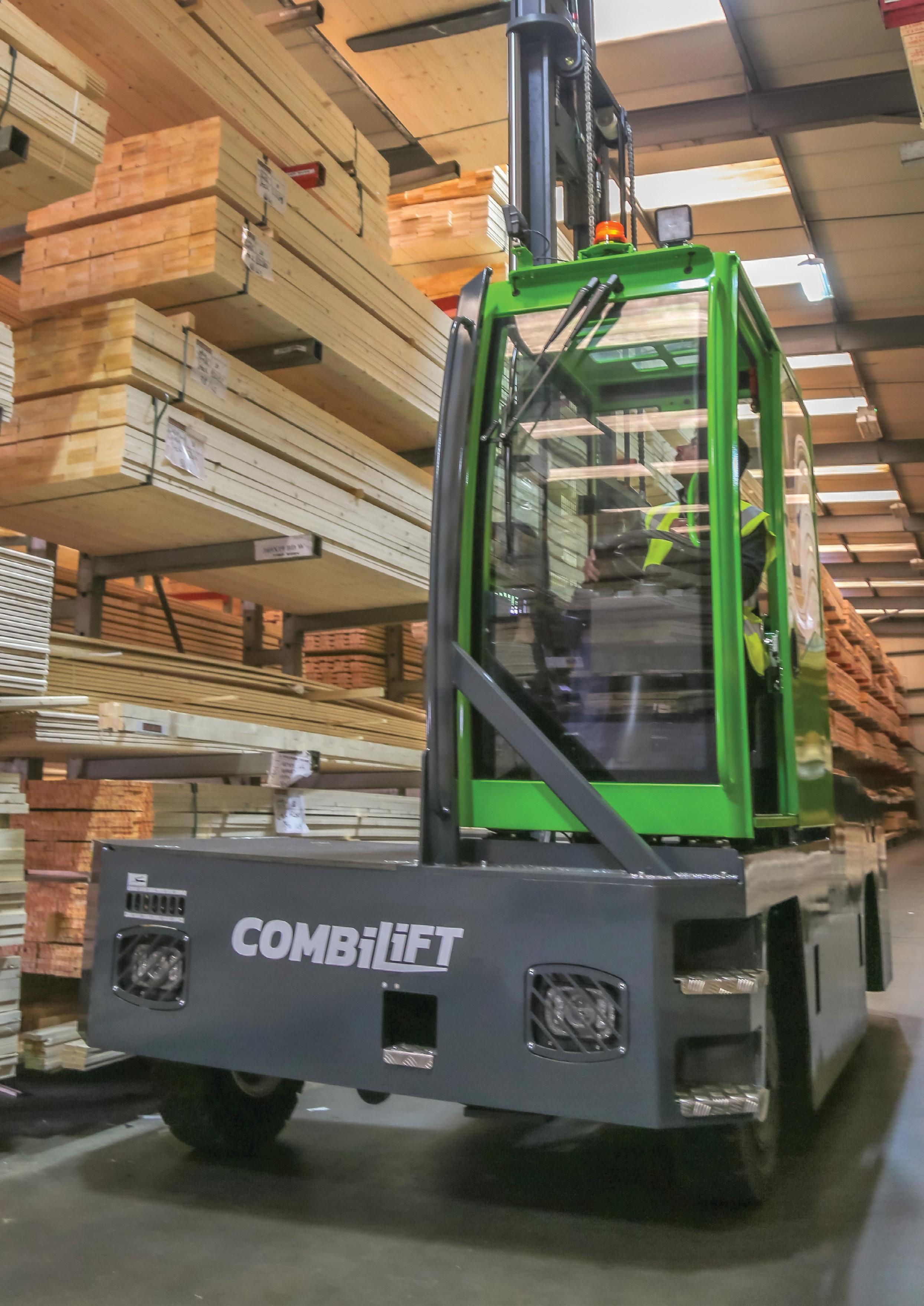
TERRY HOWELL 20 The independent timber and builders’ merchant on streamlining trading and business processes DATA DRIVEN FORESTRY 28 Digitising the world’s forests to understand trees better and fight climate change COMBILIFT 18 Going greener with electric powered vehicles AUTUMN 2022 www.timbermedia.co.uk ISSN 2517–26X (PRINT) 18



Discover the power of an ERP and how it supersedes SAGE, Xero and Quickbooks in our on-demand webinar. Don’t let your existing business management software stunt your growth Scan the QR Code to watch now READY. SET. GROW | ECISOLUTIONS.COM/UK
02 News
The latest news and views from across the industry.
12 2022: a challenging year
The timber industry has experienced a tricky 2022 with supply chain issues likely to continue to the end of the year. Timber Development UK CEO, David Hopkins explains more.
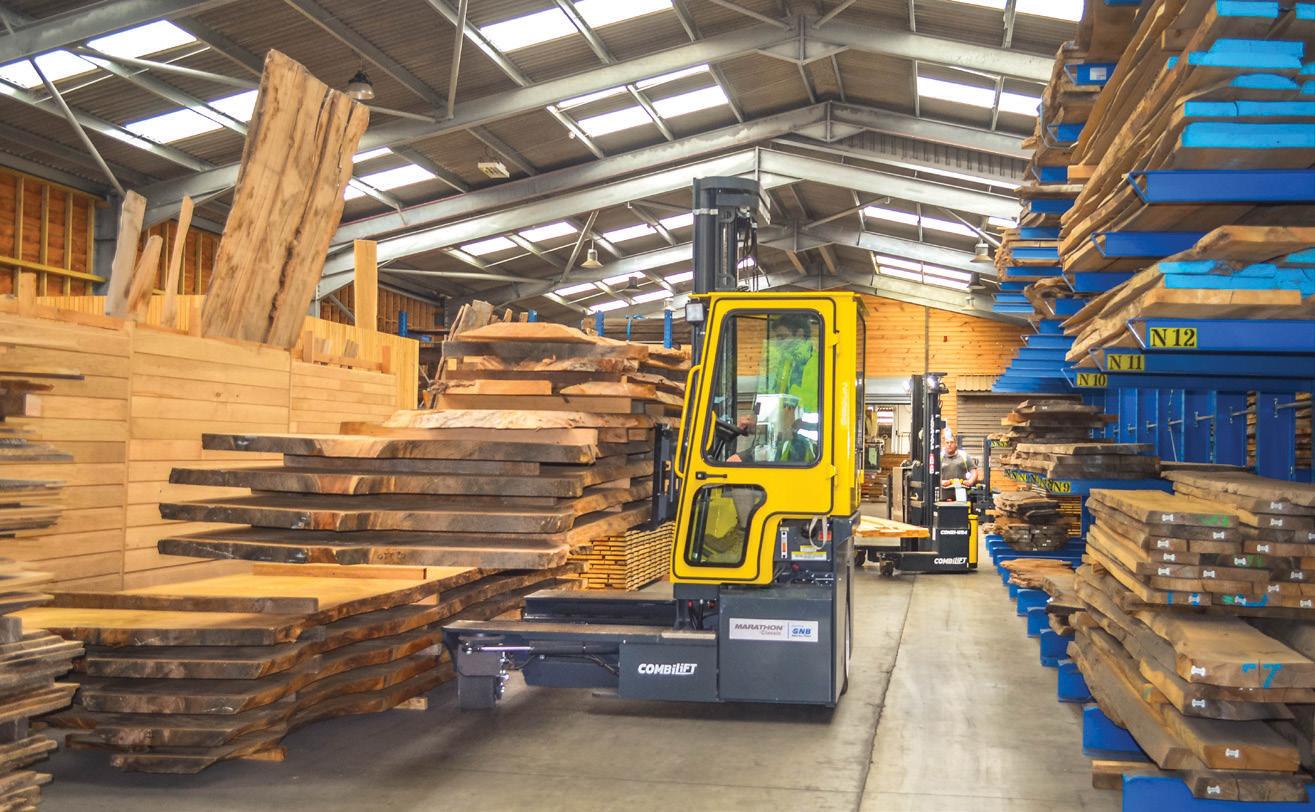

16 Part L and Going for Greener
Getting to grips with the updated Part L of the Building Regulations should be at the forefront of anyone wishing to achieve net zero targets and improve building performance.
18 Cover Story: Combilift
As materials handling manufacturer Combilift points out – switching to electric power is not only good for the environment, but also good for your workforce, neighbours and your balance sheet.
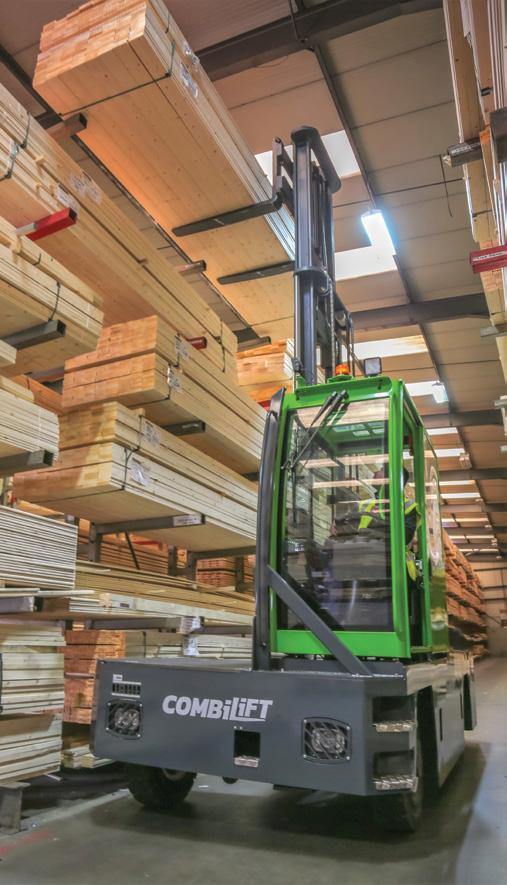
20 Local Landmarks
We caught up with Luke Brown, head of retail & development at T G Howell & Sons, to find out more about how a small independent merchant is helping keep its customers satisfied.

24 Trade & Talk Timber
As UKCW Birmingham returns to the NEC from 4th to 6th October 2022, Timber Expo will play a main part of the show as the UK’s only dedicated timber exhibition.

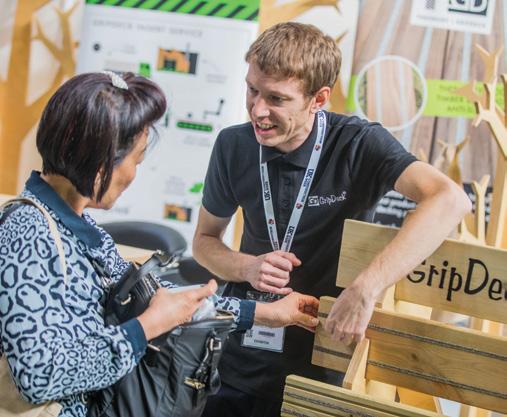
28 Data & the Three Pillars of Sustainable Forestry
According to Rolf Schmitz, co-founder and co-CEO of CollectiveCrunch, digitising the world’s forests is essential to understanding and fighting climate change.

32 Reduce Your Plastic Waste
With concerns surrounding plastic packaging in the construction supply chain, both TDUK and the National Buying Group have offered guidance and support.

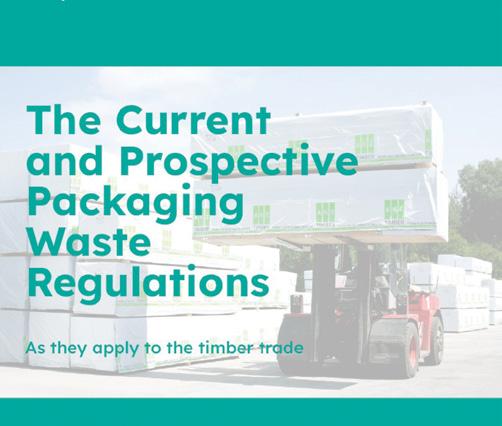
Managing Editor: Terry Hanlon
terry.hanlon@timbermedia.co.uk
01925 872371
Artwork: Pete Awad
artwork@timbermedia.co.uk
Follow Timber Media:
@Timber_Media
Registered address: 9 Viaduct Street, Newton-le-Willows, Merseyside WA12 9PL
Company registered in England and Wales. Company Number 10839173.
The Perfect Partner for the Timber Industry

Timber Trader UK Magazine Autumn 2022 01 www.timbermedia.co.uk @Timber_Media 1816 20 24 32 1202 28
TIMBER TRADER UK ISSUE 18 CONTENTS
combilift.com Timber Trader UK magazine 185 x 62 Liz Feb2022.indd 1 18/02/2022 14:58:44
Timber sector continues trade body consolidation
A new Affiliation Agreement between Timber Development UK (TDUK) and the Wood Protection Association (WPA) has set the template for further consolidation of the timber industry, helping to drive the mass adoption of timber as a sustainable construction solution.

TDUK has been formed from a merger between the Timber Trade Federation (TFF) and The Timber Research and Development Association (TRADA), creating the largest, most comprehensive supply chain body in the UK. TDUK now spans more than 1500 member businesses representing everything from sawmill to specifier. The WPA is the UK authority on wood protection and plays a lead role in influencing, developing and promoting technologies that enhance the performance and value of wood as a building material.
Under the Affiliation Agreement, TDUK and WPA will continue to operate as independent membership organisations, but WPA will act as the TDUK’s centre of expertise on flame-retardant treatments, wood modification and preservation – providing the essential technical, quality assurance and support services under a united strategy to grow demand for added value treated timber products that can be trusted.
The TDUK Affiliation Agreement with WPA is part of a bigger mission to align all wood and timber technical specification information under one roof. In so doing, TDUK aims to empower architects, designers, specifiers and engineers with the knowledge and confidence they need to use wood in their projects.
TDUK CEO, Dave Hopkins commented: “This affiliation agreement formalises what is already a very good working relationship. WPA provides TDUK with the opportunity to access unrivalled specialist experience, information, data, technical expertise and team resources from another vital part of the timber supply chain. It is another clear example of TDUK’s mission to create the most comprehensive supply chain body in the UK, so we can act as an agent of change toward more sustainable, low-carbon forms of construction. WPA and TDUK’s missions are already closely aligned. So, it makes perfect sense to work together to achieve greater impact as timber takes centre stage for the race to net-zero construction.”
WPA chief executive Gordon Ewbank added: “Wood treatments are an integral part of the timber supply chain, so it makes good commercial and technical sense for WPA and TDUK to share our respective capabilities and speak with one voice on treatment related matters. Our agreement to become a TDUK affiliated trade association is a further step in what has been a growing and fruitful partnership in recent years, providing mutual benefits to both associations, our customers and, most importantly, our members.”
TDUK will be officially launched later in the year and will have a strong presence at UK Construction Week at the Birmingham NEC in October.
More at
Timber Trader UK Magazine Autumn 2022 02 www.timbermedia.co.uk @Timber_Media TIMBER TRADER UK NEWS
www.ttf.co.uk www.thewpa.org.uk
EGGER boosts recycled content through investment

Wood-based material manufacturer, EGGER UK Limited, has invested over £15 million into recycling operations at its site in Hexham. The investment reinforces the company’s commitment to make ‘More From Wood’, by improving the quality of recycled wood used to make EGGER’s chipboard panels.
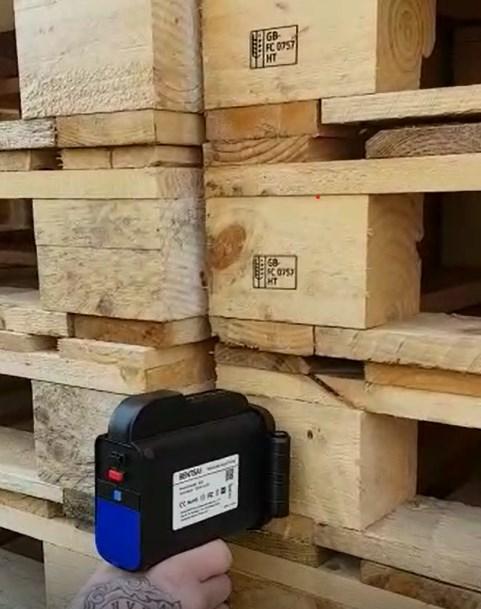
Employing the latest technology, the new recycling plant will segregate, clean, and chip waste wood that would otherwise be burnt or sent to landfill. Recycled material maintains the carbon stored in the wood and benefits the environment.

Thanks to the new, state-of-the-art processing facilities and the high-quality recycled material processed, EGGER can increase the amount of recycled wood in each chipboard panel it produces. By improving its recycling processes to get a better-quality raw material, EGGER can guarantee that the quality of the panel is not compromised.
Alex West, product manager at EGGER UK, said: “Increasing our recycled content answers the demand from the interior design, furniture, and housebuilding industries for more environmentally


conscious products. We are a major supplier to these industries, so it’s important that we lead the way when it comes to sustainable product innovation. Not only does this investment strengthen our closed loop production cycle, but it also demonstrates the importance and commitment the company places on a sustainable supply of raw materials.”
Plans for the project started in 2019, with breaking ground taking place in October 2020. Led by Andrew Shepherd with EGGER’s dedicated UK project team, installation was supported by the wider EGGER Group, Cubby Construction, Mibex Ltd, Garwen Enterprises, and Parkgate. The team has collectively spent over 130,000 hours on this project and navigated many external challenges during the build, including COVID-19, skill shortages, and material availability. After commencing commissioning in August, chipboard production with increased recycled content is underway.
Timber Trader UK Magazine Autumn 2022 03 www.timbermedia.co.uk @Timber_Media
More at egger.com TIMBER TRADER UK NEWS
Handheld printers for all your timber marking needs Tel: 0870 803 1877 www.timbermark.co.uk
TIMCO makes finals of Lloyds Bank
British Business Excellence Awards
Leading supplier of products for the construction and industrial sectors, TIMCO has been announced as a finalist in the Mid-Market Business category of The Lloyds Bank British Business Excellence Award for the first time.
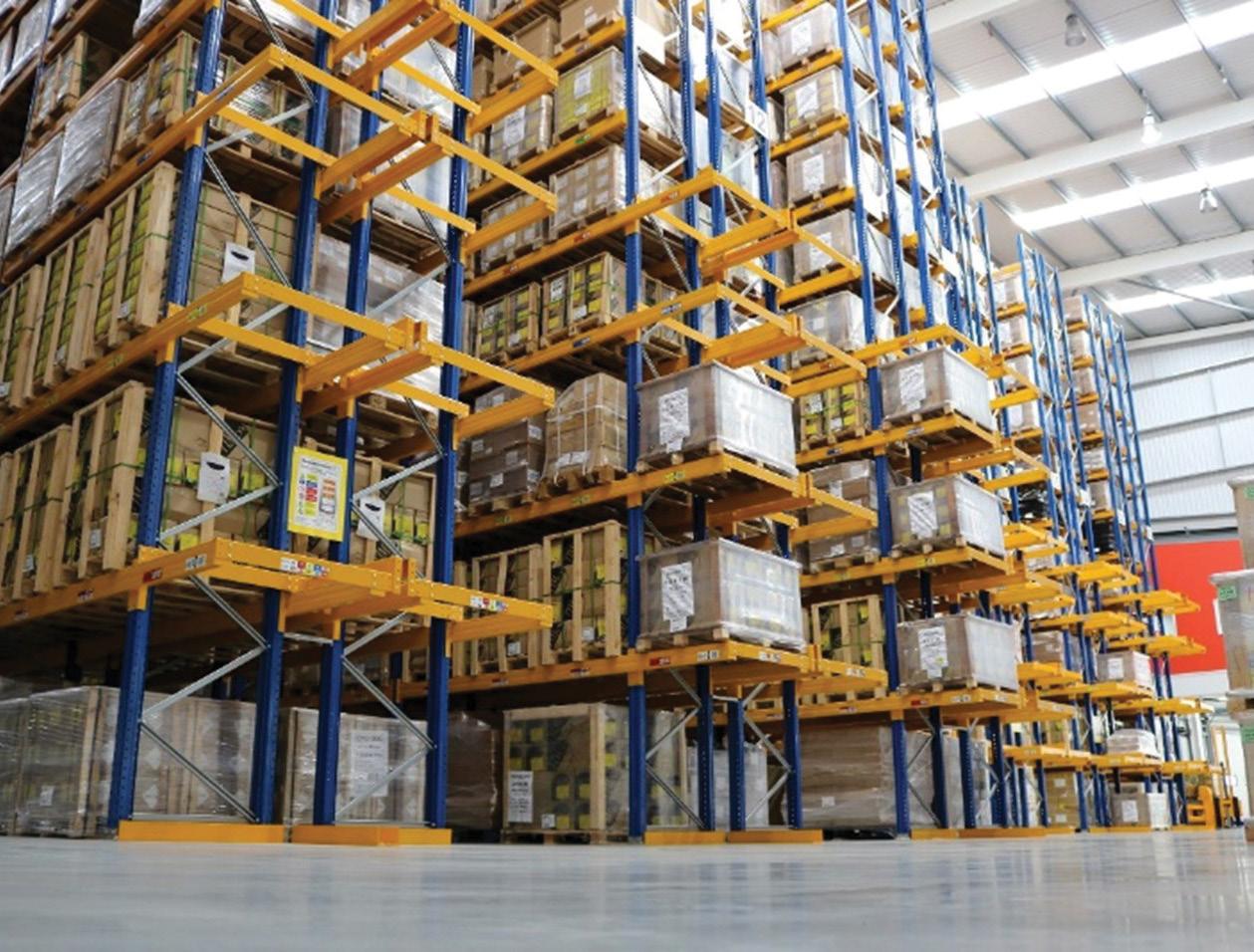
The Lloyds Bank British Business Excellence Award is the elite business awards programme for businesses of all shapes and sizes. Hundreds of companies were entered in the prestigious national awards, hoping to be recognised for their hard work, innovation and success.
TIMCO is a one-stop-shop for over 4,500 independent merchants across the UK and Ireland, supplying more than 8,000 essential products that trade professionals rely on every day, such as screws, fasteners and fixings, nails, adhesives and chemicals, powertool accessories, hand tools, building hardware and ironmongery and PPE.
Simon Midwood, managing director of TIMCO commented: “Making the finals of the British Business of the Year Award is a huge pat on the back for all our staff, who provide an exceptional service to our customers every day. I’d also like to thank our customers for their continued support in our landmark 50th anniversary. We’re looking ahead to the next 50 years and continuing our strategy of providing the essential products the trade rely on, while providing an excellent service.”
The awards host a year-long programme of networking events, roundtables and judging processes, all of which will culminate in a spectacular awards ceremony to reveal the winners, on 8 November 2022 at the Grosvenor House Hotel, London.
More at www.timco.co.uk
New network for women in woodworking
An online network has been launched to allow women working in the woodworking trades – carpentry, joinery, cabinet making – to connect and support each other. The network is called Women in Woodwork and it has been established by the Women and Manual Trades (WaMT) programme, which is part of not-for-profit company Procure Plus, in partnership with the Institute of Carpenters. Women who are working or training in woodworking trades are eligible to join the network, which takes the form of a private Facebook Group.
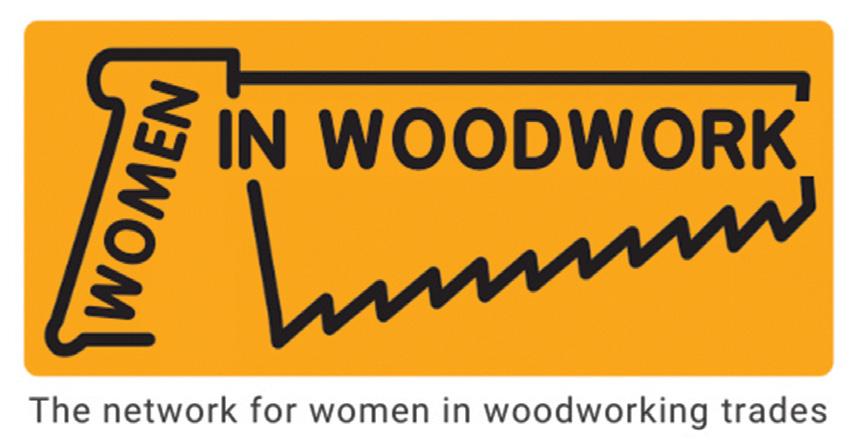
The organisations involved in setting up Women in Woodwork recognise that women are hugely under-represented in these trades, and indeed all the building trades, and believe that a dedicated forum for women to ‘meet’ will alleviate the isolation that women can experience, and which can prevent women from having a sustainable career.
Women in Woodwork follows the success of the Open Circuit Group for women in electrics, which was also set up by the WaMT programme
in 2018 and has connected over 300 female members who use the network to discuss topics such as workwear, technical problems and tips, and to share work opportunities.
Fiona Sharp, social value director at Procure Plus which runs the Women and Manual Trades programme, says: “The Women in Woodworking Group has been set up to allow women working in these trades to be connected and to come together. Peer support is so important to women, especially those who are training or just starting out, and can have a huge impact on whether or not they decide to continue on their career path. Better retention of women in construction and the building trades is something we want to address. We invite carpentry, joinery and other woodworking contractors to promote the network to their female employees.”
Women
Timber Trader UK Magazine Autumn 2022 04 www.timbermedia.co.uk @Timber_Media TIMBER TRADER UK NEWS
are invited to join Women in Woodwork at www.facebook.com/groups/womeninwoodwork
Covers adds to its green ambitions

Covers Timber & Builders Merchants has added three brand new electric forklift trucks at its Chichester depot, further supporting the company’s ambitions of reducing its carbon footprint and reaching net-zero for carbon emissions. The builders’ merchant is committed to increasing its fleet of electric machinery and road vehicles. The new electric forklifts at Chichester are in addition to the seven already being used at the depot.

In 2022, Covers has replaced eight of its diesel fork trucks with electric machines, and 11 more are due to enter service across the group in 2023. Covers has also been working to reduce the carbon footprint of its road-going fleet by replacing traditional fuelled cars with alternative fuel, fully electric and hybrid vehicles. In the last year, 18 fully electric cars and 16 hybrid vehicles have been added to the fleet, and Covers is committed to replacing the remaining conventional cars in the next few years.
Adam Conrad, group transport manager at Covers commented: “We are dedicated to minimising our impact on the environment and are constantly re-evaluating all aspects of our business. There have been significant improvements in technology for both plant machinery and road-going vehicles. By taking advantage of these modern electric vehicles, we can cut the emissions released from our depots and reduce our overall carbon footprint. Continually investing in new electric vehicles and forklift trucks across the fleet is one way we are doing this.”
These new electric vehicles and bulk bags are part of a range of sustainable initiatives Covers has implemented to help it reach its net
zero goal. These include, installing solar panels to the roofs of the majority of its depots, utilising ultra-low consumption LED lighting, sourcing timber that is certified by FSC and increasing the amount of waste that is reused and recycled (currently this is at 80%).
More at www.coversmerchants.co.uk
Timber Trader UK Magazine Autumn 2022 05 www.timbermedia.co.uk @Timber_Media TIMBER TRADER UK NEWS
Beesley & Fildes invests £1.2 million in timber mill upgrade
Beesley & Fildes, the family-owned independent builder’s merchant, has invested £1.2 million in its timber milling facility in Widnes in response to increase demand for both timber stock items across the company’s branch network, and bespoke orders.
The timber mill, acquired by Beesley & Fildes in 2004, produces the skirting, architraves, flooring, planed timber, door casings and certified fire door casing kits sold across the company’s 11-branch network and online. It also fulfils bespoke orders from both the branches and customers, including matching legacy timber features and providing like-for-like timber details for heritage projects.
The £1.2 million investment programme is designed to increase efficiency and throughput, enabling them to offer reliable and cost-effective supply with full accountability, traceability and quality assurance.
The investment includes two new Weinig planing and profiling lines, which will replace the mill’s existing planing equipment, enabling increased throughput, fast set-up and a consistently excellent finish at the timber mill. The market-leading Weinig P3000 and P1500 machines can be pre-programmed and will store settings for repeat jobs, enhancing efficiency and enabling faster operation with a single operative for each machine.
Also included in the new investment programme is a new, Britishmade, fully-automated Stenner re-saw that will convert timber for the production of skirting boards, fence panels and feather-edged
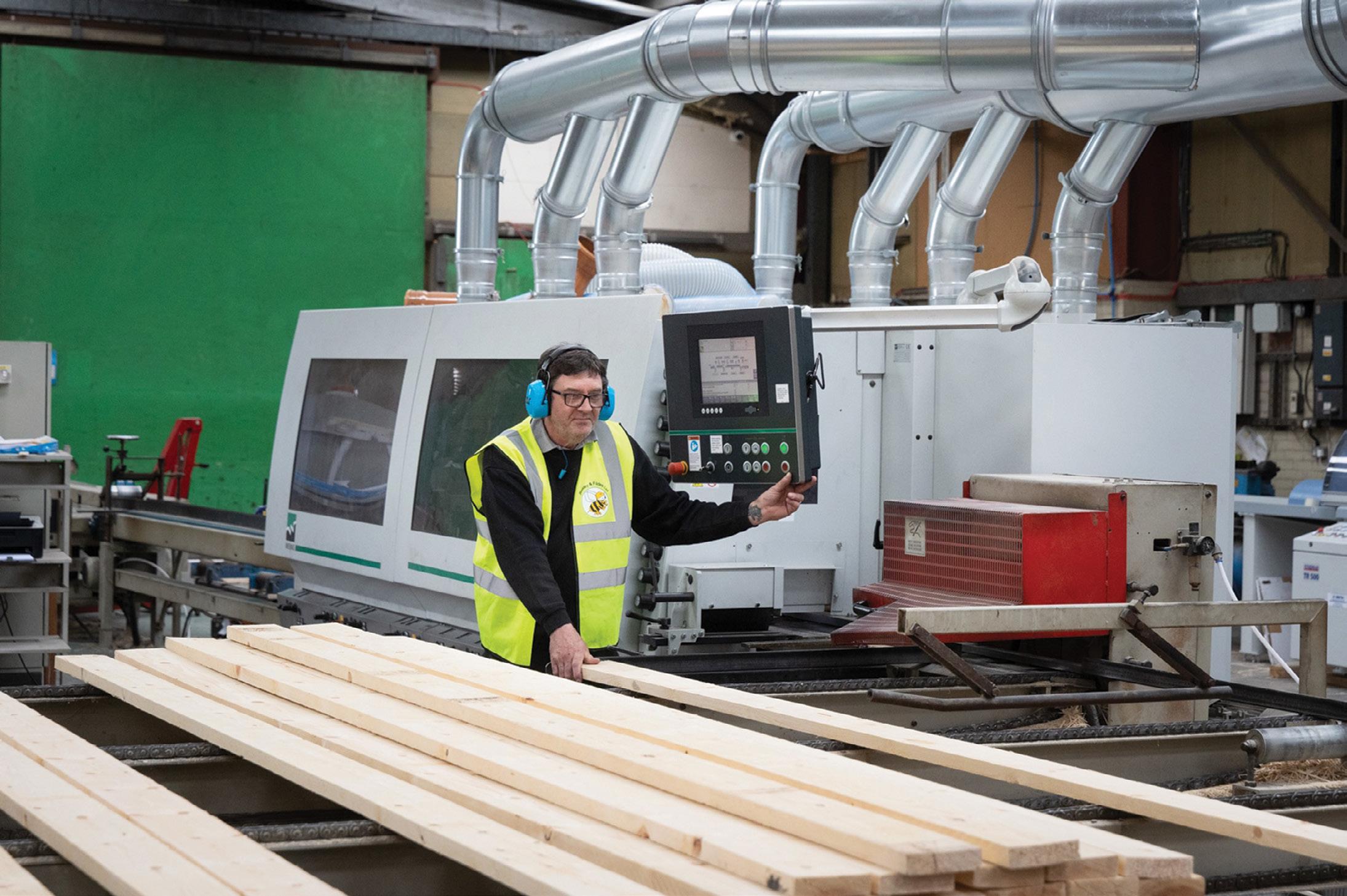
boarding. Requiring just a single operator, the new re-saw provides Beesley & Fildes with industry-leading re-saw technology, increased capacity and broader in-house processing capabilities to boost supply chain reliability for customers.
Investment has been co-ordinated with an upgrade to the mill’s extraction system and tool room, ensuring the facility provides a safe, comfortable and digital-enabled work environment that will futureproof timber milling capabilities. The upgrade means the experienced timber engineering and processing team will be able to load CAD drawings straight to the new machines and all machines will operate on an integrated digital system that will ensure high levels of accuracy, real-time management information and prioritised workflows.
James Beesley, commercial director at Beesley & Fildes adds: “The timber mill at our Widnes branch is an important part of our offer, both in enabling us to stock all our branches and in our ability to produce bespoke items for customers – if it can be made from timber, we can make it. This investment programme is all about enhancing our capabilities to prepare for continuing growth and ensure we deliver consistently efficient and accurate timber processing. In addition to the new equipment, we are also recruiting a timber machinist apprentice, investing in the future of our business and our community with an opportunity for a young person to develop skills in the sector.”
More
Timber Trader UK Magazine Autumn 2022 06 www.timbermedia.co.uk @Timber_Media TIMBER TRADER UK NEWS
at www.beesleyandfildes.co.uk
MEDITE® makes it real
Designers and artists with broad imaginations, architects and specifiers across all of the nations, from wardrobes to beds our quality can’t be denied, one of our innovative products can even be used outside. Outdoor kitchens and games, a summerhouse withstands all kinds of weather all the year round.

Through the heat of the summer into cold winter chill, still a half century later MEDITE makes it real.
Join the MEDITE MDF community online to receive the latest updates. Upload your project images to be entered into a prize draw. Sign up to receive a free gift.
Visit meditemakesitreal.com for more information. Dreamers welcome!
Timber Trader UK Magazine Autumn 2022 07 www.timbermedia.co.uk @Timber_Media
New appointments at Donaldson Group
Leading timber expert, Donaldson Group, has appointed Graham Johnston as CEO of its retail and distribution division in a newly created role. Graham joins the Donaldson Group from ASDA where he was senior director of omnichannel customer support, running a large UK and international operation alongside delivering a technology and cultural transformation programme to provide an innovative customer experience for millions of customers, across multiple channels.
Following a period of growth and expansion, Graham’s new role forms part of a new structure for the Group and the creation of three new divisions: offsite, interiors, and retail and distribution. Graham will be responsible for leading the retail and distribution division of the business, including timber merchant MGM Timber; distributor of insulation and drylining products, James Donaldson Insulation; Nu-Style Products, which manufactures Perform Panel, a high-performance wet wall panel and Plane & Simple, an online DIY marketplace.
Commenting on the appointment, Andrew Donaldson, CEO of Donaldson Group, said: “Retail behaviours have been evolving across all industries, with a move toward online purchasing being expedited by the COVID-19 pandemic. As our Group portfolio continues to grow, we aim to ensure that our offering grows with our business and with our customers. Graham’s excellent experience optimising multiple customer channels for globally-recognised brands is an enormous asset to the Donaldson Group, and we are looking forward to his expertise and insight as we develop our own retail and distribution channels.”
Graham added: “Bringing together the physical and digital retail businesses is a refreshing and forward-thinking move by the Donaldson Group, and I’m delighted to be joining this newly formed division as CEO. Joining a business that has such a rich history of innovation and growth over the past 162 years is a real honour and I’m looking forward to working with our talented teams across the group to carry on that spirit of innovation and shape the next chapter for the retail and distribution business.”

The Donaldson Group also recently appointed Steve Galbraith as managing director of two of its merchant retail and distribution subsidiary businesses, in addition to his existing position as managing director of Nu-Style Products. In his new role, Steve will take on the management of Scotland’s leading independent timber merchant, MGM Timber and insulation material and specialist building product supplier, James Donaldson Insulation.
Steve said: “This is a fantastic opportunity and I’m proud to be taking on this new role within Donaldson Group. I’m extremely fortunate to be inheriting such a strong, experienced, market-leading team, and I’m looking forward to working with them to grow the businesses in line with the Donaldson Group strategy. Core to this will be ensuring the teams have even better tools and skills with which to do their jobs – adding value for our staff, which will result in even better service and added value for our customers.”
Rhino Wood comes to the UK market

International Timber, a leading importer and distributor of bespoke, sustainable timber and panel products, has announced stocks of a new FSC-certified range of modified timber.
Rhino Wood, of which International Timber is the sole UK distributor, is manufactured from sustainable, plantationgrown pine. It undergoes a process of thermal modification which brings the moisture content down to below 5% and turns the pine from a yellow colour to a more aesthetically appealing walnut brown which will naturally weather to a beautiful silver-grey.
It is then pressure impregnated with a non-toxic compound which solidifies within the cells of the timber, creating a long-lasting
low-maintenance timber which can rival the durability of traditional hardwood. Their manufacturing process uses waste products as an energy source – using clean energy over fossil fuels. In recognition of their contribution to curbing deforestation, they received the WWF Climate Solver Award in 2014.
Kerry Wardle, marketing manager at International Timber said: “We are delighted to be stocking Rhino Wood, with stocks due to arrive early in September. This timber is a game changer for the UK market which is struggling with global supply chain issues. Not only is Rhino Wood an environmentally responsible choice thanks to its sustainable sourcing, but it delivers when it comes to performance too. The impregnation
treatment increases the strength of the pine timber by up to 60% without decreasing its bending ability or elasticity, resulting in a class 1 durability rating – making it ideal for endless applications such as cladding, decking, pergolas, gates and laminated beams.”
More at www.internationaltimber.com
Graham Johnston
Timber Trader UK Magazine Autumn 2022 08 www.timbermedia.co.uk @Timber_Media
TIMBER TRADER UK NEWS
More at www.donaldson-group.co.uk
The new name for CaberWood MDF
Our pioneering MDF is engineered to give the quality results professional users require, making it the range of choice for trade and building professionals as well as architects and specifiers.
View the entire range at: CaberMDF.com

Timber Trader UK Magazine Autumn 2022 09 www.timbermedia.co.uk @Timber_Media
Warringtonfire marks 50 years of ‘making tomorrow safer than today’
Warringtonfire is marking the 50th anniversary of its first commercial fire test, which took place at a newly completed fire testing laboratory in High Wycombe, Buckinghamshire, in the summer of 1972. 50 years later, what is believed to be the UK’s oldest existing fire resistance testing laboratory, continues to operate. Today, it is one of Warringtonfire’s main sites and is a centre of excellence for the testing of timber fire doors.
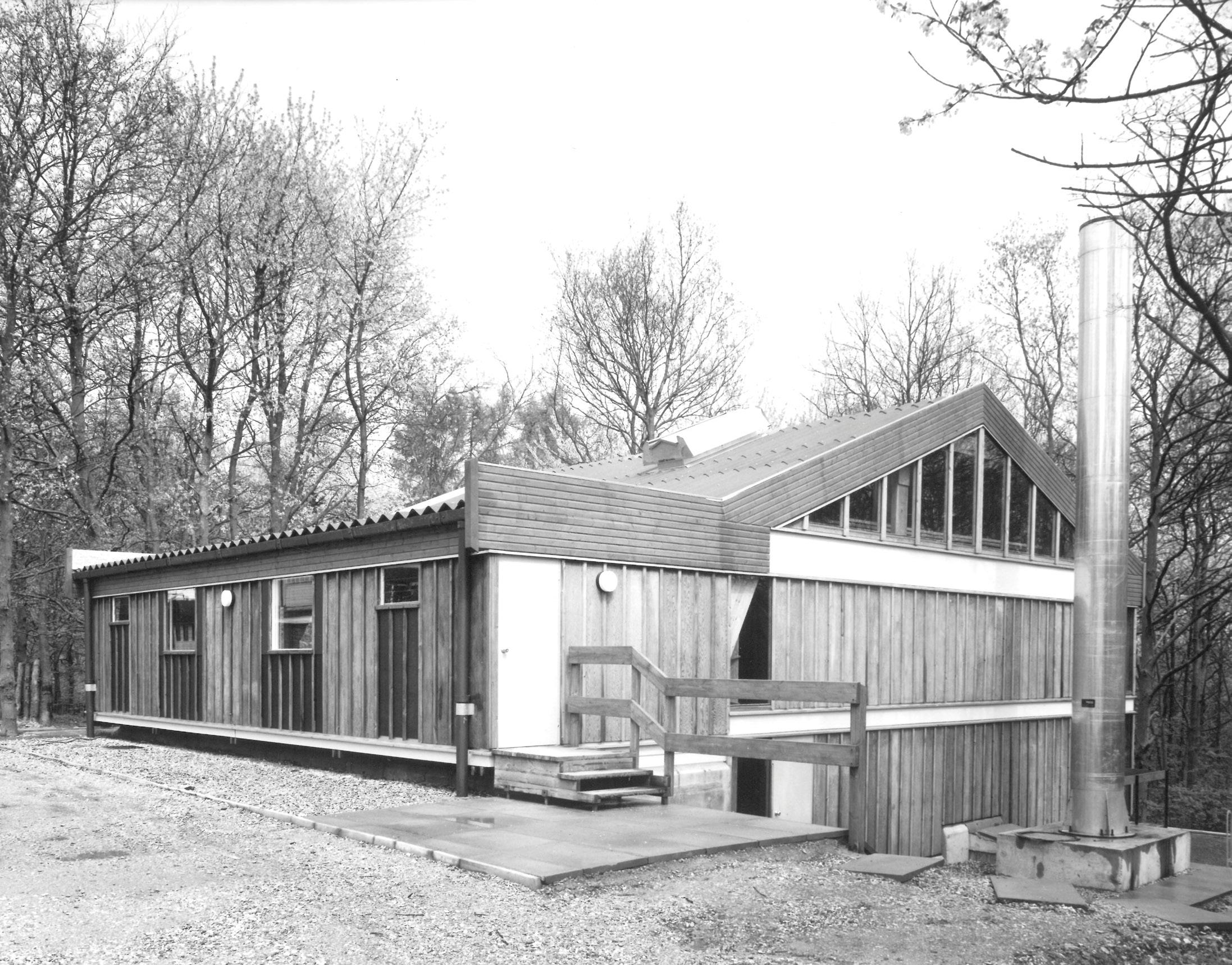
In addition to being an early pioneer in fire testing, Warringtonfire has remained at the forefront of the industry. Through its collaboration with trade associations and standards committees, Warringtonfire’s team of highly respected technical experts continue to play a pivotal role in raising standards in the fire protection industry. Recognising how much customers rely on specialist technical knowledge to support them through the testing process, Warringtonfire has continued to invest heavily in building a world class team of technical experts and has one of the largest global teams in the industry.
Mark Cummings, technical director at Warringtonfire, said: “Since 1972, we’ve conducted tens of thousands of fire tests at our High Wycombe laboratory, all designed to ensure that the products our
customers develop are safe, compliant and fit for purpose. It never ceases to amaze me that many of the products that we all walk past every day, in offices, airports, schools or hospitals, will have been developed and tested at our facility at High Wycombe and we’re extremely proud of our work.
“However, we’re not resting on our laurels and with the significant changes we’re seeing in the built environment landscape today, we know there’s much to do if we are to continue to deliver on our purpose of making tomorrow safer than today. Our focus for the future is to continue working with key trade associations and standards committees using the deep technical expertise we possess, particularly of those colleagues in our Scope and Governance team, to constantly raise industry standards.”
To give back to the industry that it has been a part of for the last 50 years, Peter Barker – technical manager at Warringtonfire will be hosting a free two-hour ‘Introduction to Fire Doors’ webinar on Wednesday 12 October.
More at www.warringtonfire.com
Timber Trader UK Magazine Autumn 2022 10 www.timbermedia.co.uk @Timber_Media TIMBER TRADER UK NEWS
The test laboratory as it was in 1972
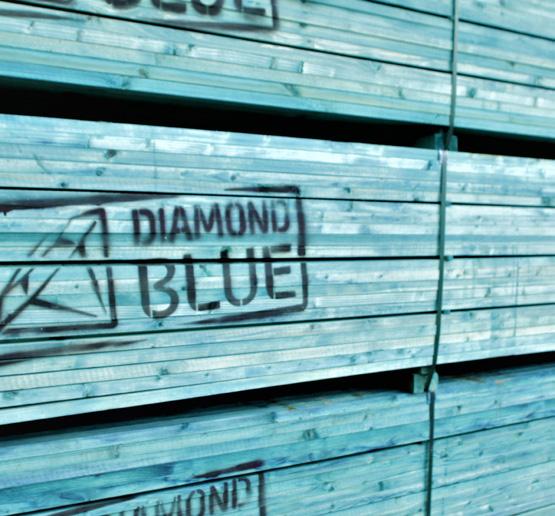









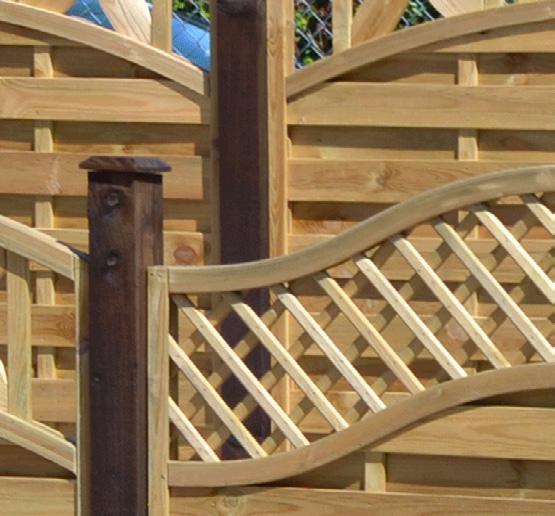
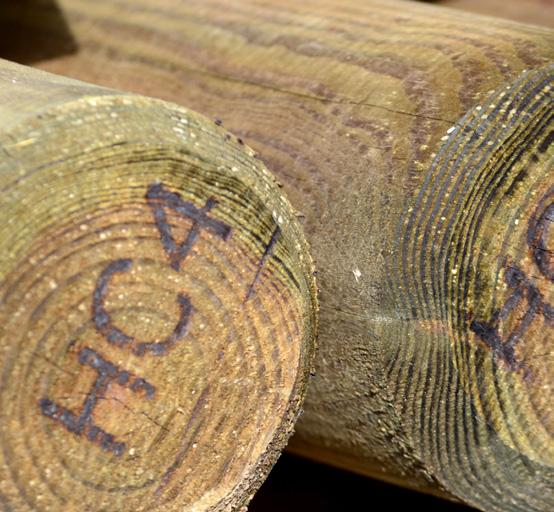

Timber Trader UK Magazine Autumn 2022 11 www.timbermedia.co.uk @Timber_Media t: 0333 3583 007 l sales@landguardpoint.co.uk www . landguardpoint.com Landguard GROUPPoint TRUSTED BRITISH TIMBER IMPORTER COMMITTED TO THE SUPPLY OF HIGH QUALITY TIMBER PRODUCTS TO THE TRADE. l ROOF BATTEN l CARCASSING l SAWN FENCING l GARDEN FURNITURE l l MACHINE ROUND POST & RAIL l SOFTWOOD & OAK SLEEPERS l l GARDEN FURNITURE l SOFTWOOD DECKING l GRASSMATE l l EUROPEAN FENCE PANELS l AGRICULTURAL PEELED FENCING l
2022: a challenging year
The timber industry experienced an interesting start to 2022 following the invasion of Ukraine and supply chain issues will continue as Timber Development UK’s latest market statement shows. CEO David Hopkins explains more.
TThe supply of raw materials has become more challenging, while the rising price of energy and its resulting impact on consumer confidence and spending is beginning to be reflected in industry forecasts for the year ahead.
An immediate consequence of the Russia-Ukraine conflict in early 2022 was the widespread call to reduce and end Russian timber imports, and the industry responded quickly with most contracts now ended or approaching the end. We expect indirect Russian imports to be close to zero in mid- to end-Q3 as the remaining material is flushed out of the European supply chain.
Timber supplies
The volume of timber imported by the UK during Q1 2022 was 2.5 million m3, nearly half a million m3 behind the record imports of Q1 2021. However, this was still a higher volume than that seen in either 2018 or 2019. In fact, January, February and March 2022 all saw volumes increase over the previous month, reflecting the strong construction demand we still enjoyed in Q1.
By April, import figures began to decline as demand slowed again. The invasion of Ukraine by Russia, inflation, downgrades to consumer confidence, and political instability in the UK are all beginning to have an impact on the market – which will likely begin to be strongly reflected in the overall supply picture in Q3 and Q4 2022.

Softwoods
Import volumes decreased by 24.8%, when comparing Q1 2022 to Q1 2021. Imports came primarily from Sweden, Latvia, Finland, Germany, and Ireland. The dominance of the softwood sector on the overall import picture is clear as, despite volume increases for both hardwoods and plywood, the loss of softwood volume remains the headline news.
Hardwoods

Import volumes increased by 29.9% in Q1 2022 compared to Q1 2021 to reach 162,000m3. Latvia has overtaken the US as the largest single supplying country of hardwoods, accounting for 24.6% of imports. This was largely due to their use in the pallet supply chain, where it has substituted for more expensive softwoods. France also overtook the USA in volume to account for 13.8% of the market, with USA falling to 8% by volume. However, the USA continues to lead all other countries by value – at £15m for 13,000m3 – with the lack of available supply imposing upwards price pressure on the smaller volume of available material.
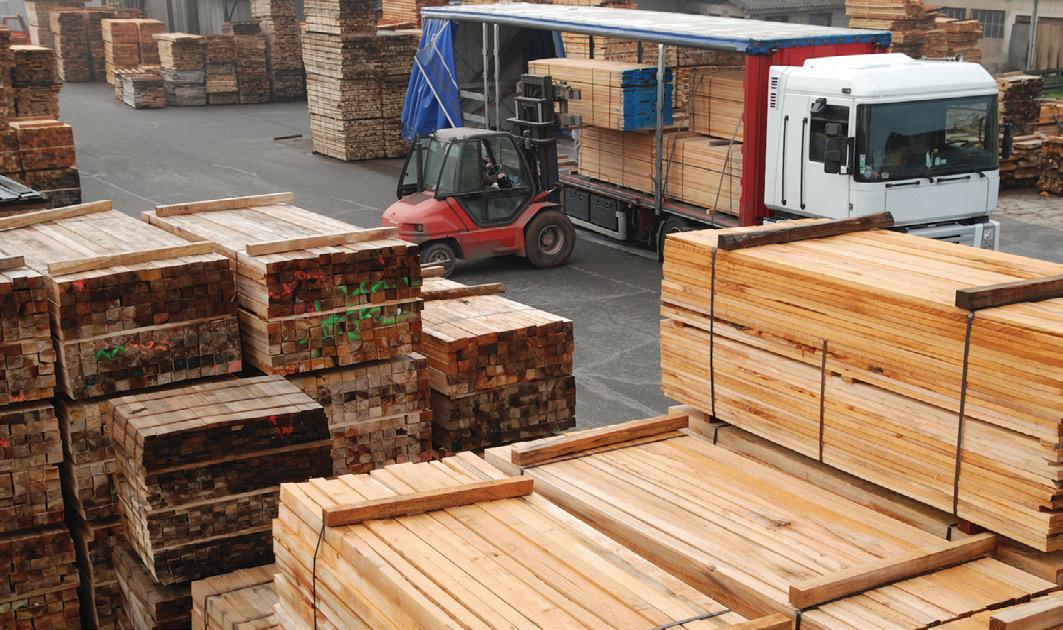
Plywoods
Imports increased by 11.9% in Q1 2022 compared to the previous year, reaching 477,000m3. Hardwood ply volumes were driven mostly by China, which continues to be the dominant source of hardwood ply products. Russia’s prominence as a source of hardwood plywood has quickly fallen away since trade sanctions were introduced. Brazil, China and Finland continued to be the main sources of softwood plywood,
Timber Trader UK Magazine Autumn 2022 12 www.timbermedia.co.uk @Timber_Media FEATURE SUPPLY & WAREHOUSING
THE KING OF COMPOSITE
Don’t be fooled by a lesser
since 1996, Trex has invented, defined, and perfected composite decking with a lineup of low-maintenance,
products that fundamentally change the way we live outdoors.
by

Timber Trader UK Magazine Autumn 2022 13 www.timbermedia.co.uk @Timber_Media
product;
high-performance
The Trex Transcend and Trex Enhance ranges are distributed exclusively by Arbor Forest Products, the UK’s leading independent timber importer and processor.
Only The World’s Number One decking brand can claim all that. Claim your free sample pack: www.arbordeck.co.uk/samples Find out more. Call 01469 535 415, email trex@arborforestproducts.co.uk or visit www.arbordeck.co.uk One of 11 contemporary colours available. Tiki Torch
while supplies of particle board, OSB, and MDF remained relatively stable in Q1 2022.
Construction output reached a record high in Q1 2022, but this is unlikely to continue through the rest of the year due to several pressures, the most significant of which is inflation, which at 9.1% is at its highest rate for 40 years. This, the cost-of-living crisis and a drop in consumer and business confidence is all likely to reduce demand for construction projects and, therefore, materials. The Spring 2022 Construction Products Association (CPA) Forecast, released in May 2022, revised its construction output growth predictions down to 2.8% from the 4.3% predicted just a few months ago.
Roofing battens

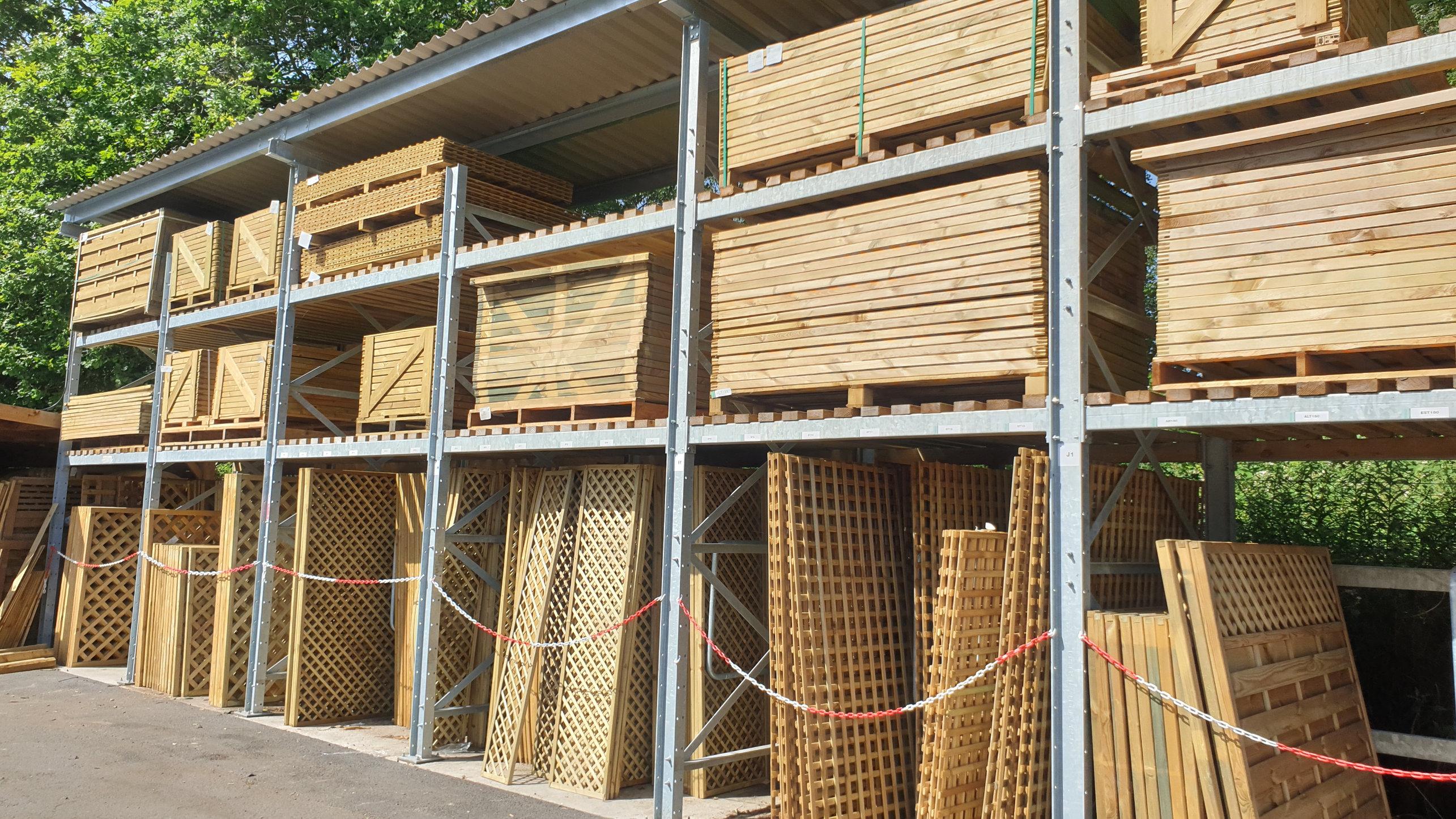
These strips of wood that you find in-between the rafters on a roofing structure are a structural product that builders and tradespeople will often walk, sit or lean on while working on a roof – with obvious and potentially deadly consequences should the battens fail while in use. That’s why roof battens are subject to strict building standards and legislative requirements, both to deliver a quality finish to the final roof, and most importantly, to ensure the safety of construction workers while on site.
‘British Standard 5534:2014+A2:2018 Slating and Tiling for pitched roofs and vertical cladding. Code of practice’ sets out the requirements for roofing battens and specifies that only battens graded to BS 5534 can be called roofing battens or used as such.
That’s why it is so important for merchants to check the quality and compliance of any roofing battens they stock.
While many manufacturers have added coloured dyes to the preservative treatment process, they use on their battens to distinguish them in the market (you may have seen gold, red or blue examples in your own stocks), these colours on their own are not enough to guarantee that the battens meet BS 5534 requirements. Instead, every batten must be indelibly marked showing that it is BS 5534 graded, its size, the supplier’s name, the timber species, and that it has been checked by a third-party certification scheme. All TDUK members who sell roofing/tiling battens and slatings participate in these independently audited quality assurance schemes so that you know you are buying a quality, fit-for-purpose product.
The full requirements for a batten to be graded can be found in Annex D of the standard. It sets out various factors ranging from knot size, frequency and position, to distortion, slope of grain, and other details. Size also matters here: battens must be a minimum size of 38mm x 25mm with very strict tolerances (50mm x 25mm when using slates) and yet we’ve seen examples of low-quality battens entering the market that are undersize, or that have the BS5534 stamp when they aren’t compliant with the standard.
Anything other than a fully graded BS5534 batten is simply a piece of sawn, treated timber and is not fit for purpose. If a merchant has any doubts about the grade of any roofing battens, they should check with the supplier and do their own due diligence, and not accept inferior products that do not meet the required standards.
New warehouses and infrastructure growth are expected to fuel a rise in construction output by 2.5% for 2022, according to the Construction Product Association’s latest forecast. The trade body predicts the industrial sector, covering warehouses and factories, to rise by 15% for 2022 and nearly 10% for 2023.
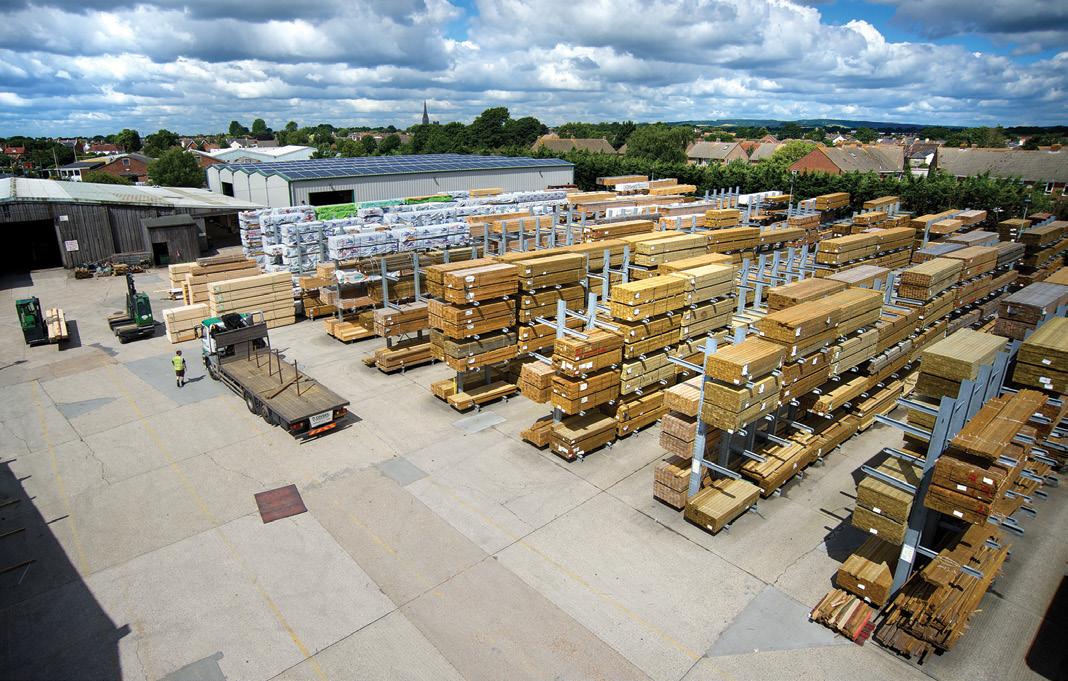
Construction Products Association, CPA, economics director Noble Francis said: “Activity continues to be boosted by the strength of online retailing as well as manufacturers’ need for increased stocks given the persistence of supply chain issues over the last two years.”
In Dublin, IPUT Real Estate recently pre-let the entirely of Quantum Logistics Park to a number of global logistics and retail businesses. The four unit 550,000sq ft park at Kilshane Cross has
been let to global logistics integrator A.P. Moller-Maersk. Unit 4 at the business park will be the first net zero carbon logistics building in Ireland and will support Maersk with its aim of achieving net zero greenhouse gas emissions by 2040. Simon Smith, country manager, Maersk Ireland said: “This is a really important next step for Maersk in the Irish market which allows us to add significant capabilities for our customers, as we continue to offer integrated end to end solutions for their supply chains. It is also with great pride that sustainability will sit out at the forefront of these facilities. For Maersk to be partnering on the first ever glulam timber framed facility to be built in this part of Europe, gives a strong signal of our commitment to our carbon zero goal.”
 More at www.ttf.co.uk
More at www.ttf.co.uk
issues to drive warehouse construction growth
Timber Trader UK Magazine Autumn 2022 14 www.timbermedia.co.uk @Timber_Media
Supply chain
FEATURE SUPPLY & WAREHOUSING Timco is regularly expanding its operations to cope with growing customer demand
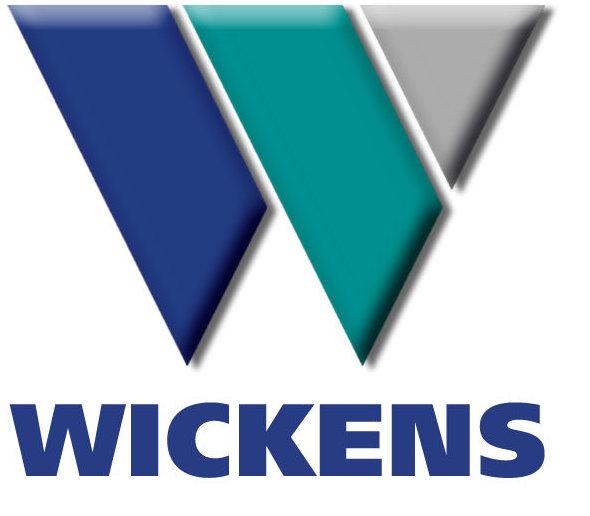






FEATURE SUSTAINABLE SUPPLY RACKINGSYSTEMS DESIGN|MANUFACTURE|INSTALLATION •Increasingstoragecapacityonsite. •Allowingaccesstoselectivestockandenablingstock rotation. •Reducingproductdamagefromstorageonthefloor. •Decreasingmaterialhandlingtimeandimprovingsite efficiency. Idealfortimberstorage, Wickensrackscanhelpyouwith… WWW.WICKENS.CO.UK sales@wickens.co.uk|01905456780
Part L and Going for Greener
Getting to grips with the updated Part L of the Building Regulations should be at the forefront of anyone wishing to achieve a net zero target and improve their building’s thermal performance.
AAs the new Approved Document Part L of the Building Regulations is now in place, minds are focused on how the new guidance will modify energy efficiency standards and thermal efficiency of newbuild homes in England and Wales.
With the climate emergency declared, housebuilders are now expected to work harder to tackle carbon reduction. With energy bills likely to be unstable for some time, the recent changes are acting as a transitional step towards the Future Homes Standard, designed to reduce greenhouse gas emissions from the UK’s built environment.
At the centre of Part L are the guidelines for constructing homes with low carbon heating technology and high energy efficiency, so the housebuilding industry and homeowners can reach the UK’s 2050 net zero targets. Under Part L, all new homes must now produce 31% less CO2 emissions in operation than what was acceptable under the previous Part L Building Regulations. To help, the new guidance outlines a raft of changes that new homebuilders must work towards to increase energy performance standards. The Future Homes Standard, which comes into effect in 2025 represents a further uplift in domestic energy usage. Homes built from that date will be expected to produce 75-80% fewer carbon emissions compared to current standards.
The 31% reduction of emissions can be achieved through a better ‘fabric first’ approach. A massive part of the change in improving thermal efficiency is also the correctly specified and installed insulation material – a vital building fabric component – and key to new homes achieving Approved Document O (Overheating) of the Building

Regulations. Also introduced earlier this year, Part O accompanies the Part L regulations to improve ventilation and prevent properties overheating and suffering from high solar gain.
Correctly installed in floors, walls and roofspace, the many types of insulation (including low carbon woodfibre) provide a barrier that prevents exterior temperatures outside from impacting interior air conditions and helping maintain a steady indoors climate – whatever the weather outside. Well-insulated building fabric helps save energy and reduces bills. A recent report by the Department for Business, Energy & Industrial Strategy, revealed that heating and power account for 40% cent of the UK’s total energy use, hence the need to address the thermal performance of the UK’s 28 million homes.
Offsite thermal options
Faced with these ambitious aims and the upcoming Future Homes Standard, Smartroof’s offsite modular roof system is an example of a system that meets these ambitious targets and can lower carbon emissions, address heat loss and is proving to be one of the most cost-effective and efficient ways for housebuilders to address thermal bridging at junction details within the roof build-up.
Tom Wright, Design and Technical Director at Smartroof, says: “The Smartroof solution offers a wide range of U-values. This offers significant increases in design flexibility as its insulation levels can be adjusted to suit the customer’s requirements. Not only does this allow the client to ‘futureproof’ their roof, but it also potentially offers significant cost savings as the SAP assessor can trade off gains from one
Image © Smartroof
Timber Trader UK Magazine Autumn 2022 16 www.timbermedia.co.uk @Timber_Media
FEATURE ACHIEVING NET ZERO
U-values
SAP 10, the latest update to the Standard Assessment Procedure (SAP) is incorporated within the revised Part L regulations and designed to ensure correct thermal modelling junctions are used.
When it comes to achieving U-values for domestic newbuild projects it is a requirement for an energy consultant to give SAP advice. SAP informs the thermal ratings of walls, floors, roofs, junction details and any bolt-on renewable technologies – the performance of which must correspond with or exceed the required regulations for the building. These elements can be changed if the property achieves the required dwelling performance. The alternative to a SAP assessment is to work on the notional dwelling specification, which must be followed as a minimum to achieve a pass. In addition, to add clarity on how to carry out U-value calculations, the updated Conventions for U-value calculations – aka BR443 – came into force in June in England and will be adopted later this year when respective Building Regulations are also changed in Scotland and Wales.
More at https://bregroup.com/sap
area to another. Achieving higher Fabric Energy Efficiency Standards (FEES) in house types specification’s will be crucial for housebuilders in order to pass SAP and comply with Part L.
“Smartroof recently carried out an independent assessment of its junction details to assess the psi value. All details have outperformed the psi values given as default in table K1 for 2020 regs. Smartroof will
Insulation Boost
Earlier this year, Knauf Insulation invested over £45 million across its two UK Glass Mineral Wool plants to boost capacity as well as improve the range, availability and sustainability of its products for the benefit of its customers.

As a result of the investment, Knauf Insulation expects to see a circa 20% improvement in the embodied carbon of products supplied from its St Helens plant, building further on its industry-leading position in terms of sustainability.
Neil Hargreaves, managing director of Knauf Insulation Northern Europe said: “These investments support the anticipated growth in demand driven by the Future Homes Standard and improved energy efficiency in new buildings as well as from more renovation of existing buildings. These developments are critical as we step up our efforts to tackle the cost-of-living crisis, climate change and energy security.”
More at www.knaufinsulation.co.uk
happily make these details available so that SAP assessors can take these into account. The ‘loft zone’ above the ceiling in a room-in-roof system will have a negative effect on SAP calculations and result in a higher U-value specification for roof components. The result will be more expensive materials and/or more follow-on trades. The majority of Smartroof systems have no structural beams, thus allowing the housebuilder flexibility to adjust their ceiling height. A system with structural beams is likely to be more restrictive when adjusting ceiling height and will result in costly compromises.
“We have always worked closely with leading SAP assessors and its ‘room in roof’ panel system is already meeting the standards required. Computer modelling enables the company to produce bespoke roofs that are tailored to a client’s needs. Production of the Smartroof system in a factory environment ensures no cold spots in the panels or spandrels that may arise from more traditional methods onsite. The system’s design makes it inherently airtight and an ideal roof solution for those developers adopting a fabric first approach. Smartroof’s in-house production facility enables it to stock a wide range of materials and insulations to ensure it meets every customer’s thermal requirement.
As the construction industry continues to attempt to secure net zero emissions across the built environment, the new Part L requirement will play a major role, alongside innovative products and systems that provide people with energy-efficient – and affordable – homes that will still be saving energy both now and for years to come.
To read more about the changes Conservation of fuel and power: Approved Document L go to www.gov.uk/government/ publications/conservation-of-fuel-and-power-approved-document-l
More about Smartroof at www.smartroof.co.uk
Timber Trader UK Magazine Autumn 2022 17 www.timbermedia.co.uk @Timber_Media FEATURE ACHIEVING NET ZERO
Plugging in to Greener Power
When Combilift was established in 1998, the world was quite a different place. In that year, Google was incorporated as a private company in California and only 9% of households had access to the internet. And in the world of industrial vehicles, diesel power was the default choice for the majority, as it was considered to offer the best performance in demanding working conditions.
Times have of course changed, and the growing demand for electric powered vehicles and equipment has been fuelled by shifting public attitudes towards pollution and more stringent legislation. This has put pressure on manufacturers and companies in a wide variety of industry sectors to “clean up their act” and to focus on more sustainability. The latter is all about taking a long-term look at how you operate, and this will often involve investment in new technology.
Switching to an electric fleet from diesel is now a much more attractive option than it once was, and this is down to improved battery performance and technology, which enables ever increasing lift capacities, longer run times and much longer intervals between charging. The latest generation of electric trucks are also versatile and can work indoors and out, which can reduce the overall number of forklifts required and consequently the carbon footprint – as well as operational costs and outlay for insurance, maintenance and so on. So what is good for the planet can also be good for your business.
Wide-ranging benefits
Talking of finances: the initial cost of an electric truck may be somewhat higher than a diesel model, but over a truck’s lifetime the TCO can work out to be better. The soaring price of fuel makes it more

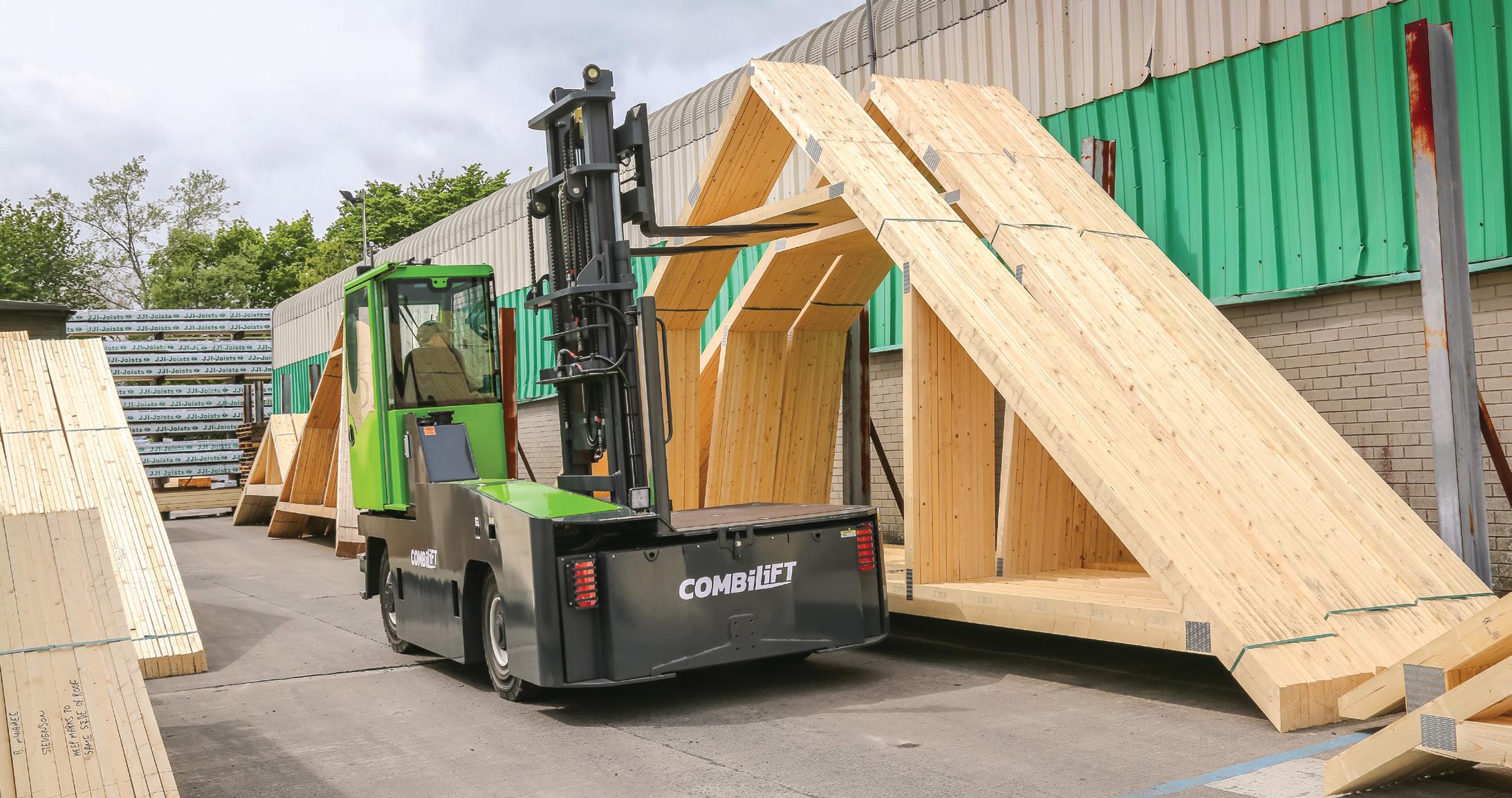
expensive than charging batteries, and this has been more of an issue since 1 April this year as it is no longer legal to use red diesel for non-road mobile machinery. As electric powered trucks do not have traditional combustion engines or hydraulic transmissions, there is no longer any need to check and top up engine fluids or lubricants. This results in longer intervals between services, for further cost saving.
But it’s not all about money either. Just as on-street emissions from traffic have proved to be the cause of serious health problems, people need
As materials handling manufacturer Combilift points out – switching to electric power is not only good for the environment, but it’s also good for your workforce, your neighbours and your balance sheet.
COMBI-FSE two directional sideloader
Timber Trader UK Magazine Autumn 2022 18 www.timbermedia.co.uk @Timber_Media
COVER STORY COMBILIFT
Combi-WR4 Pedestrian Reach Stacker
to be protected from pollution at their place of work. The British Safety Council has called for limits on the amount of exposure to diesel emissions, and an electric fleet obviously improves air quality on site and reduces the potential risks to employees, visitors and customers alike. Timber merchant James Latham is on course to replace all of its LPG multidirectional Combilift trucks with electric ones at a number of its sites. This has resulted in a high level of approval from the drivers, one of whom commented: “there is more space in the cab so more legroom, and when you are working in hot weather, conditions are much cooler and more comfortable as there is no heat emanating from the engine.”
Noise pollution is an underestimated threat to human health, wildlife and environmental quality, and more and more companies are aiming to quieten down their operations by using electric trucks. One of these is Lawsons Timber which operates from 10 sites in London and numerous others across the south of England and the home counties. David Harvey, group transport manager said: “As a lot of our branches are in residential or urban areas, our electric trucks have enabled us to keep noise levels to a minimum for our neighbours – and of course for the drivers and visitors on-site.” At James Latham, quiet operation has also been beneficial as many depots work 24 hour shifts to maximise delivery capacity, so good neighbourly relations can be maintained despite these anti-social hours.
Combilift’s CEO and co-founder Martin McVicar says: “We made our first electric C-Series over 18 years ago, and we are supporting our customers in their aims for more sustainable operation by expanding our range of electric powered products. In the last year alone, we added four new electric models to our portfolio, and more than 60% of the trucks that come off the production lines in Monaghan are now electric. As more and more of our customers are opting for electric power it is obvious that they are as committed to sustainability and a circular economy as we are.”
New models
The new models recently developed by Combilift are eminently suited to the requirements of the timber sector. The Combi-XLE multidirectional forklift, which was launched in 2021, has a 5,000kg lift capacity so combines emission-free operation with powerful performance. It benefits from the same features as its original IC counterpart: high ground clearance, large, cushioned front and rear tyres and a spacious cab, allowing smooth operation on semi-rough terrain whilst offering a high level of driver comfort. It incorporates up-to-the-minute technology such as the patented all-wheel traction that reduces tyre wear and load swing and enhances braking. Also included is a newly developed, patented Eco-Steer System which provides a smaller turning radius and improved user experience.

The latest model, which premiered at various trade shows in mid-2022, is the Combi-FSE – a four wheeled, two directional sideloader with 5,000kg or 6,000kg lift capacity. The patented traction system plays a major part
in ensuring optimum performance in all weather conditions. Sensors in the front steering axle linked to the innovative Electronic Traction Control system enable the two independent 15kW drive motors on the rear axle to be controlled individually, with the speed of each wheel governed by the steer angle of the front wheels to provide improved steering control for the operator, better truck turning radius and reduced tyre wear.
This new technology, when combined with regenerative braking (which recaptures the truck’s kinetic energy during deceleration and can be used to recharge the batteries to extend battery life), makes for Combilift’s most advanced steering system on its four wheeled trucks to date. The generous glazing of the cab, particularly the roof to floor windscreen, allows the operator to have an excellent field of vison of the load, the machine and the surroundings guaranteeing the best operator visibility of any comparable truck.
Martin McVicar adds: “We introduced our first 4-wheel sideloader around 10 years ago after initial requests from companies in the timber sector, and it has since become pretty much a standard solution for those who run intensive schedules which clock up many operational hours. The advancements in battery technology since then means that it was a natural progression to develop this electric model, which will help customers to drastically reduce their carbon footprint.”
More at www.combilift.com
Sussex based English Woodlands Timber (EWT) supplies boards, cladding and a wide range of species such as Oak, Elm, Ash and Sweet Chestnut to the bespoke joinery sectors. It switched to Combilift’s handling solutions from counterbalance trucks and now operates two C4000E trucks together with two 2t capacity Combi-WR4 multidirectional pedestrian stacker trucks.
These have been instrumental in enabling it the company to maximise storage space without needing to expand facilities and to keep pace with the recent 50% growth in business. Equally important is that they are electric, according to Director Ian McNally. “Sustainability is a byword at the EWT woodyard, with solar panels on roofs and charging stations for those who drive electric
vehicles. Chippings are used for biomass and other material is recycled into bedding for horses for example. Nothing goes to waste and it is electric power wherever possible here, so Combilifts were therefore the machines of choice, as they are emission free and are also very quiet compared to diesel machines, which is much appreciated by all on site.”
electric fleet for English Woodland Timber
C5000 XLE Multi Directional Forklift
Timber Trader UK Magazine Autumn 2022 19 www.timbermedia.co.uk @Timber_Media
COVER STORY COMBILIFT
All
Local Landmarks
We caught up with Luke Brown, head of retail & development at T G Howell & Sons, to find out more about how a small independent merchant is helping keep its customers satisfied.


TT G Howell & Sons started in 1956, manufacturing wooden ladders at a small family site in South Wales. It has now grown and expanded its operations so that over 65 years later, there’s nothing they don’t know about timber, with over 70% of its sales coming from treated sawn products. The business now operates two merchant sites and a five-acre wholesale distribution yard with treatment facility. As they have grown over the years, people have remained at the heart of what they do and is something the business is incredibly proud of
What sets the business apart compared to other merchants locally?
Timber availability is something that we’ve always strived ourselves on. We want our customers to feel confident that we have the material they need – when they need it. For this reason, we typically keep a large volume of our timber on the shelf. This gives us the ability to service orders internally and externally with a much quicker turnaround than many other local merchants. To assist this, we operate our own delivery service with vehicles ranging from 3.5 - 44T. This allows us to cater to a range of customers, from home deliveries to order direct to site.

How has the timber material supply chain been over recent months – is it stabilising? Where have the pressure points been and is the energy crisis changing trade?
Over the last few months, our supply chain has started to stabilise. Materials are now much more accessible, in complete contrast to what we saw over the last 12-18 months. We would even go as far as saying material has been easier to source than it should be, for the time of year. The pressure points have come from the range of timber that’s been available since mid-2020 and uncertainty over Russian timber supply following the start of the war in Ukraine. More recently, our current energy crisis has caused a change to our customers shopping behaviour, as many people remain uncertain about the cost of their bills over the winter period.
What are the market leading timber products for the trade and construction sector that you are seeing?
Our core focus as a business is fencing and landscaping product. With this in mind, feather edge and standard sawn timber remain the leading products from our range. We always make sure our timber is supplied from FSC or PEFC-certified suppliers. In fact, this is one of our criteria for suppliers, as we would never consider offering uncertified or conflict timber.
How does T G Howell & Sons see the merchant sector developing over the next 18 months – how can the sector improve and thrive more?
The next 18 months look set to be a challenge for the merchant sector. Coming off the back of two very strange years, things seem to have slowed down to pre-Covid demand. Our business and certainly the industry learnt a lot over the last couple of years. As an independent, we’re aware that we relied too heavily on sales just through our merchant sites, failing to invest as much as we should have in our digital systems and online. The huge upturn in customers shopping from home throughout the pandemic gave us an opportunity to really drive this area of our business. As we begin to return to the new ‘norm’, a lot of these shopping behaviours seem to have remained and customers are shopping around a lot more before committing to purchase materials. We only see this trend increasing over the next 18 months, as the future remains uncertain on the increase in cost of living. That’s why we’re continuing to invest in this area of our business to better serve our customers and to remain reactive to changes in our market.
See overleaf for more on how T G Howell & Sons have partnered with Kerridge Commercial Systems to improve its business efficiencies and their end level of customer service.
More at
L-R Josh Howell (retail director), Martin Howell (chairman), Daniel Howell (wholesale director)
Timber Trader UK Magazine Autumn 2022 20 www.timbermedia.co.uk @Timber_Media
www.terryhowell.co.uk FEATURE MERCHANT FOCUS






Timber Trader UK Magazine Autumn 2022 21 www.timbermedia.co.uk @Timber_Media K8: Business management solution of choice for the timber industry • Cloud-based software that’s affordable, flexible and scalable • Optimise your warehouse management and meet your customers’ delivery expectations • Get trading online and open up new channels to market quickly and easily • Powerful financial control – manage your rebates, automate invoice processing • Improve your team’s performance, manage your margins and boost profits www.kerridgecs.comYour business. Your way.
Go Optimum Go Digital
The business selected K8 because it is specifically designed and developed for the merchant industry, improving efficiencies and their end level of customer service.
K8 is a sophisticated and intuitive trading platform that enables merchants to manage everything from front-end sales to back-office administrative functions. Additionally, the software is designed to help merchant and distribution businesses improve their day-today performance with boosted profits and margins they can manage in detail.
Established in 1956, Terry Howell began its life manufacturing wooden ladders before diversifying into sawmilling fencing material at their timber mill in South Wales. Since then, the business has grown to include two merchant locations and a five-acre wholesale site, supplying timber and fencing material to independent merchants across the UK. The company prides itself on quality, service and value for money.
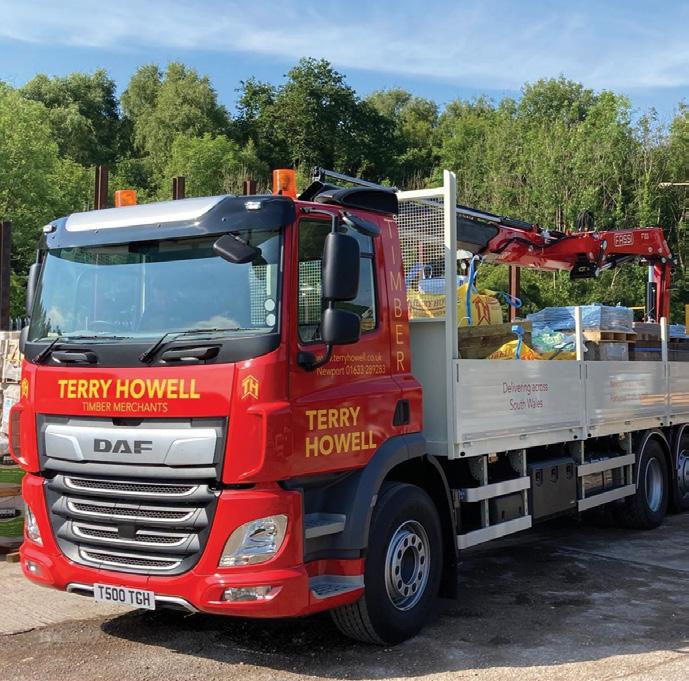
“As the scale of our business continued to grow,” says Martin Howell, chairman at Terry Howell. “We needed a way to ensure our sales and inventory processes were more efficient. That way, we could meet increased demand and improve the end experience for our customers.”
Recognising the need to streamline and improve accuracy with business management software, Luke Brown, head of retail at Terry
Howell, explains why the timber merchants chose K8. “What really stood out to us about K8 was the scope for tailoring the system to suit our specific business needs. In addition, we were really encouraged by the knowledge and expertise of the consultancy team. Having individuals on our project who understood our industry was a huge help in the build stages, with the ability to bounce ideas off each other and share best practices on how we could get the system to work for us.”

Since implementing the system in November 2021, the business has already seen a huge change in its ability to forecast sales and stock requirements. Historically, Terry Howell had relied on handwritten sales orders and inventory processes, which was proving inefficient as the scale of the business continued to grow. Luke explains further: “This was a huge process change for our business, especially going from pen and paper, but our team have been phenomenal in rising to the challenge.”
And while Terry Howell has already seen improvements since implementing K8, they’re not stopping there. The business is partnering with KCS on their next project, the implementation of K8 WebPro. Scheduled to roll out later this year, K8 WebPro is a cloud-based ecommerce add-on that allows businesses to receive orders online directly into the K8 system.
Supporting both B2B and B2C trading models, the system was the perfect choice for Luke and the team. “Since K8, we’ve been keen
to focus on the change in consumer buying behaviour, especially online,” adds Luke. “For example, in just a quick internet search, you can find a list of a dozen companies that might be supplying timber or building materials locally. We wanted a way for us to provide our customers with a better online experience and really shout about who we are as a family business. K8 WebPro helps us do that.”
It’s clear to see that Terry Howell has seen steady and continuous growth since being founded in 1956. Moving to K8 has streamlined their existing business processes and given them a platform to accelerate their digital journey over the next year. Currently, Terry Howell continues to gain momentum and coupled with K8, the company shows no signs of slowing down.
In 2020 Terry Howell, an independent family timber and builders’ merchant in South Wales, partnered with Kerridge Commercial Systems (KCS) to implement their leading ERP solution, K8.
Timber Trader UK Magazine Autumn 2022 22 www.timbermedia.co.uk @Timber_Media
More at www.terryhowell.co.uk www.kerridgecs.com
FEATURE MERCHANT FOCUS

Trade & Talk Timber
As UKCW Birmingham returns to the NEC from 4th to 6th October 2022, Timber Expo will play a main part of the show as the UK’s only dedicated timber exhibition.
Co-located events at UKCW Birmingham include Timber Expo, the UK’s only dedicated timber exhibition, which has been running for 10 years.
Attended by architects, local authorities, merchants, developers, housebuilders and contractors, Timber Expo is designed for people who use, specify, design and build with timber, and offers the opportunity to join hundreds of other brands showcasing their latest innovation, products and services.
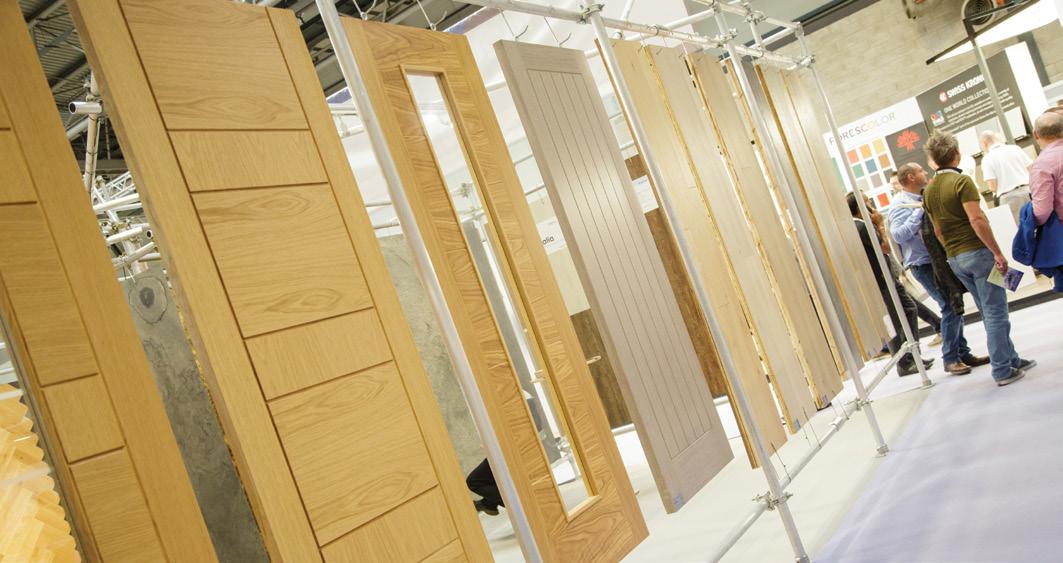

Timber Expo which is backed by and held in collaboration with Timber Development UK (TDUK), BM TRADA, Timber Construction and Timber Trader will have a programme of industry leaders, including architects, developers, housebuilders and merchants to name a few. They will debate and discuss the sector as we tackle post pandemic supply issues, post Brexit challenges, the impact of the Ukraine conflict on timber supply chain and the drive to net zero as we strive to meet COP26 targets.

The exhibitor profile includes structural timber frame, sawmills, merchants, glulam, SIPs, CLT, fixings and fastenings, timber cladding, doors and windows, mouldings, skirtings and flooring products.
Confirmed exhibitors at Timber Expo include Rokamat, Engineered Timber Solutions Ltd, Woodolex Ltd, the Ghana Forestry Commission and Hanson Plywood Ltd who specialise in the import, storage and distribution of wood-based panel products throughout the UK.
Nathan Garnett, UKCW show director, commented: “UK Construction Week has always put timber at the heart of our event, and this year it will be all the more important that we use our platform in Birmingham to promote timber in construction. The drive to net-zero and the increasing need to improve quality in construction mean we need to enable a culture change in the way we build.
“This will be the seventh edition of our Birmingham show bringing together the whole industry. Following the hugely successful launch of the first-ever London show earlier this year, the standard has now been set for UK Construction Week Birmingham.
“Although the construction sector makes up a significant proportion of the UK’s working population, we’re all aware of the huge skills shortages in the industry, and with the impact of the global pandemic and current climate, the importance and the appetite to raise awareness of the fantastic opportunities in this sector has only increased. As one of the youngest and most dynamic cities in Europe, Birmingham is the ultimate setting for this show, and we can’t wait to be back.”
UK Construction Week Birmingham will celebrate culture change in construction with three days of debate and discussion from top speakers on how the industry can move forward to tackle its biggest issues, including quality, fire safety, sustainability, offsite manufacturing, mental health, and improving diversity and inclusion.
As well as Timber, visitors will also be able to find sections dedicated to Building Materials, Digitalisation, Infrastructure, Energy, HVAC, Surface & Materials, Offsite Construction and Skills & Careers.
Officially opened by architect and Channel 4 presenter George Clarke, UKCW Birmingham will also feature sessions and seminars in the Sustainability Hub forming the conference programme at the heart of Timber Expo. The hub programme will tackle the issues, layout strategies and present exemplar case studies to help the sector reach its net zero targets.
Timber Trader UK Magazine Autumn 2022 24 www.timbermedia.co.uk @Timber_Media FEATURE TIMBER TREATMENTSFEATURE TIMBER EXPO 2022






www.timbermedia.co.uk The show for those who design & build with timber, and those who manufacture & distribute timber products www.timberexpo.co.uk REGISTER FREE #timberexpo CO-LOCATED WITH
Sustainability seminars:
4th October
10:45-11:30: Whole Life Carbon: The commercial reality of carbon in construction 11:35-12:20: ESG Finance, construction and the climate challenge 12:25-13:10: Energy policy: where do we go from here 13:15-14:00: Social sustainability is another way of saying ‘social value’ 14:05-14:50: Re-designing an industry for all-round health
5th October
10:30-11:15: Levers for success; key points for government and business to work together 11:20-12:05: Best practice: exemplars of national and international collaboration we can learn from 12:10-12:55: Meridian Water - works 13:00-13:45: City Trees - Timber for the city 13:50-14:35: The World’s tallest timber building 14:40 – 15:25: Building with waste
In addition to the Sustainability Hub and main stages, the Careers Centre will provide a series of talks aimed at those interested in a career in construction, whether that be graduates, students in further education, or those looking at a career change.
UKCW Birmingham will see over 6,000 products on display from over 300 exciting exhibitors including Bosch, Schneider Electric, Google, Graco Distribution, Wavin, Cemex, Hanson Plywood and many more. This year, the multi award-winning show has also attracted an abundance of overseas exhibitors, including brands from as far afield as Australia, India, Norway, Turkey and the UAE. With more than 75% of
Key show features include:
• UKCW Role Model Awards: UKCW Birmingham will also host the UKCW Role Model Awards, celebrating the pioneers of construction. The award ceremony will be taking place on the main stage on 5th October
• Seminar Programme: a comprehensive seminar programme and CPD opportunities
• Innovation Zone: a dedicated showcase of innovative products
• UKCW Careers Fair: launched at the show in London and coming to Birmingham, get free face-face career advice and meet and network with top employers at the UKCW Careers Fair
A packed seminar programme at UKCW will focus on a myriad of topics including skills, social value, business, innovation and regulation, major projects, procurement and housingcomplemented by 20 dedicated CPD sessions across the three days, covering everything from Supply Chain Resilience to the Building Safety Act. Seminar highlights include:
Day One:
• Skills: UKCW Birmingham will look at the skills agenda, and on the solutions that have been found by industry leaders, such as Rick Lee OBE, Chief People Person at Willmott Dixon, who was instrumental in securing the RICS Inclusive Employer Quality Mark for the Tier One Contractor.
6th October 10:30-11:15: Creating a workforce to support a low-carbon future 11:20-12:05: A new model for upskilling professionals 12:10-12:55: Circular economy, circular city 13:00-13:50: Housing; what is the biggest issue among all the big issues 13:50-14:40: Innovation in Timberchanging the world with wood 14:40-15:30: The Cork House
exhibitor slots already taken, UKCW Birmingham is on track to be the biggest and best yet.
Designed to connect the whole supply chain and be a catalyst for growth, UKCW Birmingham is the must-attend construction event this Autumn and is expecting around 25,000 attendees.
The 2022 show has an even stronger emphasis on future development in the industry and this year’s theme is Celebrating Culture Change in Construction that will be present throughout the show, which is backed by all the industry’s leading organisations, including AICO, Bosch, Hanson, Northgate and Quadrant Building.
• Social Value: Ann Bentley, Global Board Director at Rider Levett Bucknall, and board member of the Construction Leadership Council, has led the way on bringing about behaviour change and unlocking social value through changes in the construction process. She will give her reflections on the launch of the value toolkit and what it can do for the sector.
Day Two:
• Business, Innovation and Regulation: Including the new Building Safety Act, the ongoing digital revolution, and the challenges facing the supply chain brought about by the pandemic and war in Ukraine.
• Economic Outlook: What does the economic outlook for the sector look like? Top economists Professor Noble Francis, Economic Director at the Construction Products Association, and Tom Hall, Chief Economist at Barbour ABI, will offer crucial information for those planning the months ahead.
Day Three:
• Major projects, procurement and housing: bringing together the solutions from the conference programme to the biggest challenges of the day. These include retrofitting the majority of UK housing stock, creating net infrastructure, and a look into the regional opportunities in the West Midlands region enabled by HS2 and its satellite projects.
Furthermore, the Careers Centre will offer visitors an array of informative talks aimed at those interested in a career in construction, whether that be graduates, students in further education, or those looking at a career change.
Timber Trader UK Magazine Autumn 2022 26 www.timbermedia.co.uk @Timber_Media FEATURE TIMBER EXPO 2022
To register for UKCW Birmingham for FREE go to ukcw-birmingham-2022.reg.buzz/pr Follow us on social media @uk_cw #UKCW2022
Safety Storage Efficiency
Enhance the Safety, Capacity & Efficiency of your Storage Facility

Manage your timber more safely and more productively using less space with Combilift’s materials handling solutions

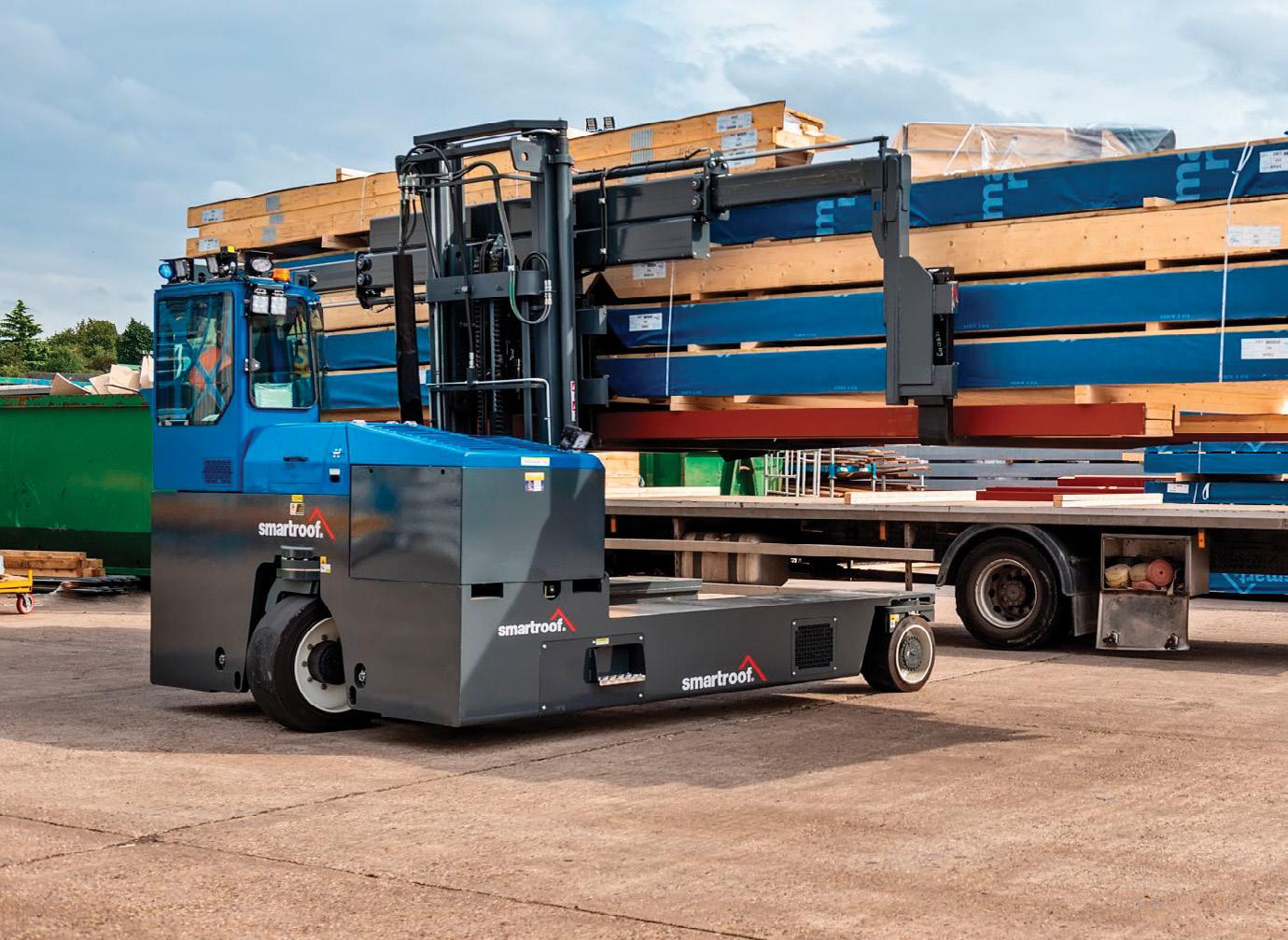

Our range of electric forklifts combine powerful multidirectional performance, emission free operation and a host of up to the minute technologies to offer the most efficient way to handle long loads up to 12 tonne.

Contact Us Today
To find out how Combilift can help you unlock every inch of your storage space
combilift.com
Timber Trader UK Magazine Autumn 2022 STAND B200
Data & the Three Pillars of Sustainable Forestry

If a tree falls in the forest, it hardly matters if it makes a sound, but it helps to know it happened. Through advanced data analysis and artificial intelligence (AI), companies that manage forest inventories or produce wood-based products can better estimate these rich resources. Increasingly, our climate depends on it.
You’ve heard that the world’s forests are critical to fighting climate change, based in part on their ability to absorb carbon dioxide, the primary greenhouse gas threatening our planet. But that’s just part of the story. Trees aren’t just for reducing carbon emissions; they are renewable resources and sustain biodiversity. Understanding more precisely how forests develop, regenerate, and are harvested is key to the planet’s sustainability.
Forests cover around 30% of our planet. In order to manage our forests for a more sustainable future, we need insights into the planet’s forests at scale. This calls for digitising these vast, analog spaces.
Three pillars of sustainable forestry
Sustainable forestry rests on three important pillars: circular economics, carbon offsetting, and biodiversity. Striking a balance among the three is important, but so is the ability to measure success across all three using data.
Circular economics – harvesting forests for raw materials is as old as mankind, and although mankind has had a spotty track record in doing so responsibly, harvesting forests for raw materials will continue to be important — even to the world’s sustainability. Wood and paper-
based products play a key role in replacing less sustainable, plasticbased products and packaging. Such products are biodegradable, and the trees harvested to create them are replaced with new trees. In a circular, sustainable forestry model, they’re used, reused, recycled, and regenerated.
Carbon offsetting – offsetting has become a critical tool in counterbalancing the harmful effects of greenhouse gas emissions. By investing in, protecting, replanting, and managing forest growth, companies sponsor through credits the capture of CO2 to offset their emissions, effectively reducing their carbon footprint. For carbon credits to be viable, and to avoid ‘green-washing’, the forest inventories of carbon projects need to be measured and tracked. Currently too many carbon projects have questionable foundations.
Biodiversity – in the process of moving toward a circular economy and carbon offsetting, sustainable forestry also needs to promote biodiversity. There will always be a need for fast-growing, commercial tree plantations – forests planted and managed to support circular industries or large-scale carbon capture – but they should be balanced with diverse forests. Biodiversity helps maintain the natural resilience of forest ecosystems and ensures their longevity for generations to come – the very definition of sustainability.
With the understanding that sustainable forestry rests on these three pillars, it’s important to understand the challenges the industry faces in strengthening them.
Circular economics needs to be more efficient. When it comes to harvesting, production, and recycling, better analytics improves
According to Rolf Schmitz, co-founder and co-CEO of CollectiveCrunch and the creator of Linda Forest software solutions, digitising the world’s forests is essential to understanding and fighting climate change.
Timber Trader UK Magazine Autumn 2022 28 www.timbermedia.co.uk @Timber_Media FEATURE FORESTRY & CERTIFICATION
SICK’s Next-Generation Distance Sensor – An ‘All-Rounder’ with Countless Possibilities
SICK has launched its next-generation OD2000 distance sensor, combining highprecision reliability with outstanding economy to deliver a versatile ‘all-rounder’ for multiple applications in timber and wood processing. The stand-alone and compact SICK OD2000 has been developed to provide a universal product family with minimal variants, while making configuration and parameterisation ‘plug and play’. With IO-Link as standard, the SICK OD2000 offers highly-versatile machine integration possibilities, while providing for diagnostics and condition monitoring.

With a large measuring range up to 1,200mm, as well as a measuring frequency of up to 7.5 kHz, the OD2000 will therefore be a trusted solution for wide-ranging positioning and quality control tasks in automated production and assembly, including robotics. Using its high-precision triangulation measurement principle, the OD2000 achieves high repeatability and linearity, and it can detect the smallest differences in height, even in the micrometre range.
With five different measuring ranges between 25 and 1,200 mm, the SICK OD2000 is ready to master any task, including demanding, high-speed measurement regardless of surface, diameter, thickness or width. It is can also solve challenging background suppression applications where precise distance differentiation or small hysteresis settings are required. The price/performance advantages of the new SICK OD2000 family are expected to be especially welcomed by production teams, system integrators and machine builders in wood processing applications, for example, for measuring wanes and board thicknesses.

Are you a timber decking or cladding supplier or installer?


Do you do things the ‘right way’? Get the recognition you deserve.
DeckMark and CladMark quality schemes are industry recognised, third-party accreditations.
They provide independent verification of high standards and best practice.
Such validation is vital to specifiers looking to ensure their projects go smoothly.
The SICK OD2000 is ready to use out-of-the-box with widely-useable default settings. The on-sensor OLED display makes parameterisation and adjustment quick and easy. Alternatively, set up via SICK’s SOPAS software has been enhanced with a new graphical user interface and a QUICK SET menu. Together with direct parameterisation via IO-Link, this is especially useful when mounting in hard-to-reach locations. Using IO-Link to access existing data also makes it easy to replace a sensor, should this be necessary, reducing machine downtime and preventing incorrect settings.
Seamless integration versatility underlines the SICK OD2000’s all-round usefulness. The OD2000 can send both adjustable analog output (mA/V) and digital output signals. Smart point-to-point communication for Industry 4.0 integrations is enabled via the IO-Link interface, which also means the signal transmission and power supply can use a single cable. With IO-Link, the OD2000 can output process and diagnostic data for condition monitoring and predictive maintenance.
“With the OD2000, SICK has introduced a brand new displacement measurement family that can be relied on by production teams to assure precision performance and consistent process quality, whatever the application,” concludes David Hannaby, SICK’s UK Product Manager for Presence Detection. “The universal concept will help to minimise inventories and ensure efficient ordering and delivery. The OD2000 is mounted in an instant and set up is completed in next to no time. Machine builders will particularly welcome the OD2000’s integration flexibility and communications versatility.”
For more information, please contact Andrea Hornby on 01727 831121 or email andrea.hornby@sick.co.uk.
SICK (UK) LTD
Waldkirch House, 39 Hedley Road St Albans, Herts AL1 5BN
Tel: +44 (0) 1727 831121 info@sick.co.uk
Get in touch and arrange your audit today
Timber
Cladding
independent, not-for-profit technical and advisory trade body.
as the authoritative source of expert opinion in the UK.
DeckMark and CladMark schemes require a full business audit and assessment followed
annual surveillance audits.
Lee & Micklethwait ©Image: Hufton+Crow
London Decking Company
Timber Trader UK Magazine Autumn 2022 29 www.timbermedia.co.uk @Timber_Media Get accredited, get noticed get the Mark The
Decking &
Association is an
Recognised
by
info@tdca.org.uk | 01977 558147
www.tdca.org.uk
performance. For example, better knowledge of the quantities, locations, and timings of harvests, as well as the production of precisely what the market needs, are critical to sustainable forestry. It’s been shown that maximising the value of forests and targeting only the wood resources producers need can improve margins of forest owners up to 7%.
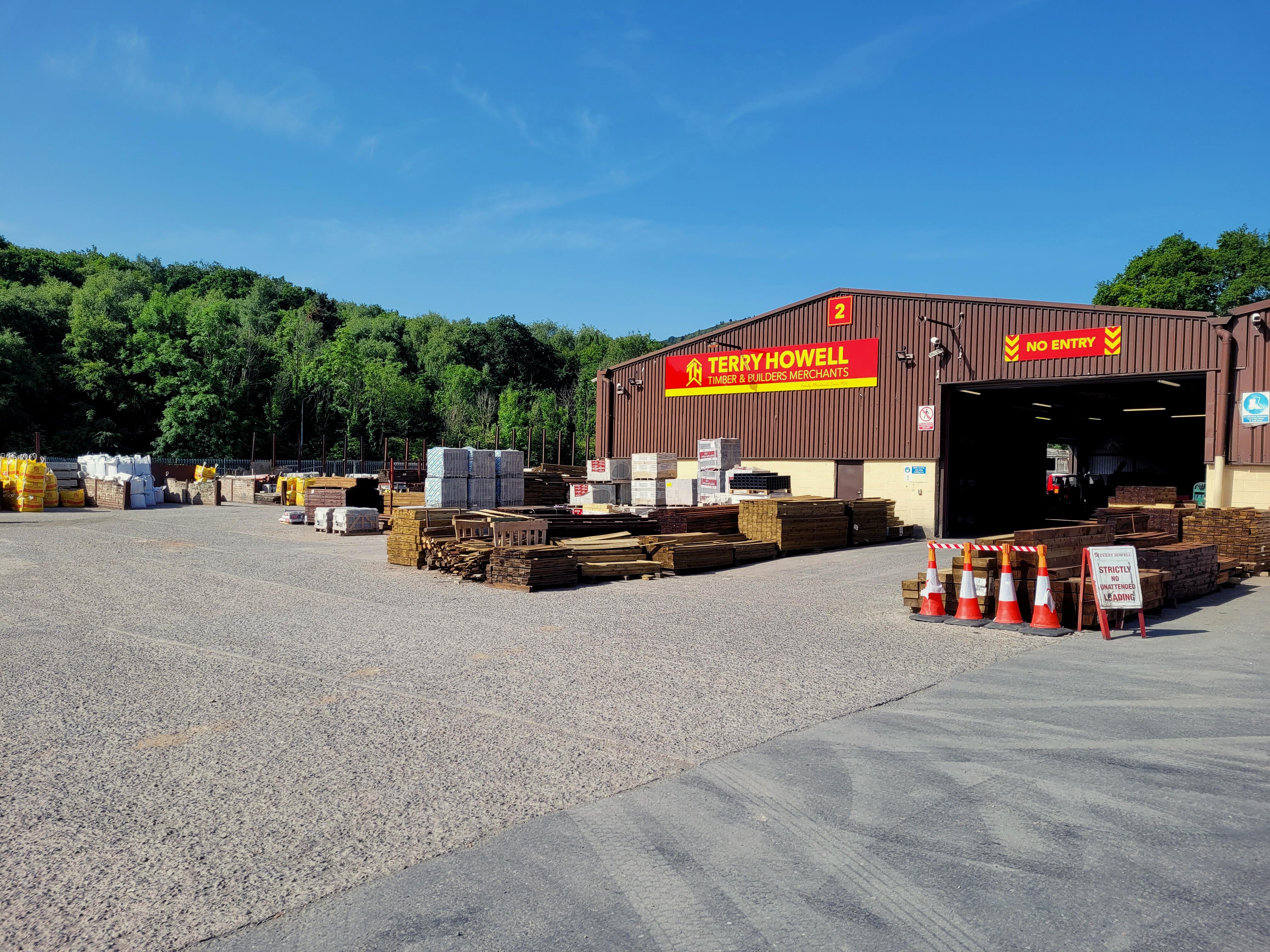
Carbon offsetting needs to be reliable. The voluntary carbon trading market is growing fast, but participating companies are at reputational risk if they claim carbon neutrality based on credits that can’t be supported by real-world conditions. Tracking carbon-capture projects using state-of-the-art technology is key not only to ensuring such projects achieve the desired, climate-saving results, but also to proving to the ecosystem of interested parties – corporations, regulators, NGOs, the public – that they do. Such tracking needs to make use of the scientific and technical resources available today.
Biodiversity needs to be measurable. Promoting diverse forest conditions that support a more sustainable planet is essential to creating natural resilience against the impacts of climate change. Several years ago, it was common to see single-species tree afforestation used to establish fast-growing forests. Such projects need to include additional, indigenous species at different growth stages to support wildlife habitat survival and guard the variety of life. All forestation efforts must be held to their claims through rigorous monitoring and verification. This requires incorporating biodiversity products, such as species mix and keystone species, into everyday forest management. The challenge of measurable biodiversity is translating these products into reality accurately and at sufficient scale.
You can’t sustain what you can’t measure
Addressing these challenges takes a far more efficient, dataintensive approach to understanding forests. To date, sustainable forestry has relied on manual and inexact methods for measuring the effects of these three pillars. In an age of digitalisation, when everything from supply chains to smart cities are being reinvented through information technology, forests have been largely out of reach. But the forest industry must adopt digital systems in all its aspects.
To promote circular economics in forestry, to establish a traceable, transparent market for carbon capture and offsetting and to ensure that biodiversity underpins all these efforts, there needs to be greater real-time visibility into forests and their conditions. Today vast parts of global forests are managed through 19th century methods: the manual sampling of trees. The industry needs to better model forests through various applications of artificial intelligence, earth observation, and machine learning.
The fact is, there exists good data about the world’s forests, whether generated through established light detection and ranging (LiDAR) technology, satellite imagery, human data collection, or other means. But it’s often disjointed and quickly out of date. Using AI, we can breathe fresh life into forestry data by feeding it into an advanced geographic information system and, through purposeengineered algorithms, create all-new, highly accurate models for growth conditions, forest density, inventories, and more. The result is a dynamically changing AI model for sustainable forestry predictions and management.
A sustainable forestry platform can, for example, better detect species in a forest to support biodiversity initiatives. By analysing forest density, it can ascertain carbon-capture potential in situations where the canopy is well preserved – giving the appearance of greater density – while its understory is thoroughly harvested.

Other advances will contribute to the pillars, too. For example, in terms of circular forests, companies will soon incorporate more GPS technology into their operations, giving the industry even more granular data about forests – down to individual trees. This will allow a data platform to generate digital twins of forests for better ‘what-if’ modeling and accurate forecasting.
Of course, any reliable and scientifically rigorous forest model needs ground truth for calibration. Over time, we will need to adopt standardised ways of collecting and storing such ground truth data if we’re to enjoy truly scalable, sustainable forest inventories. The digital transformation of forests creates clearer visibility into the circular economics, carbon offsetting, and biodiversity of sustainable forestry. With better data, forests can have a far greater impact on climate change.


Timber Trader UK Magazine Autumn 2022 30 www.timbermedia.co.uk @Timber_Media
More at www.collectivecrunch.com FEATURE FORESTRY & CERTIFICATION



Timber Trader UK Magazine Autumn 2022 31 www.timbermedia.co.uk @Timber_Media Contact Us 01633 246 000 YOUR FAMILY TIMBER MERCHANTS WWW.TERRYHOWELL.CO.UK Newport Branch 01495 762 849 Pontypool Branch For wholesale enquiries contact: 01633 289 283
Reduce Your Plastic Waste
TThe timber trade is a £10 billion industry in the UK with the members of Timber Development UK accounting for 85% of that industry, encompassing timber importers, merchants, agents and manufacturers. With such a wide array of member interests, every facet of the packaging waste regulations are bound to be encountered in some form or other.
Packaging is an important component for the safe transport of products, including timber, yet it is also a major contributor to waste production in the UK. To tackle this problem, and incentivise better, more efficient use of packaging, including reuse and recycling, the UK Government has introduced some major legislative changes.
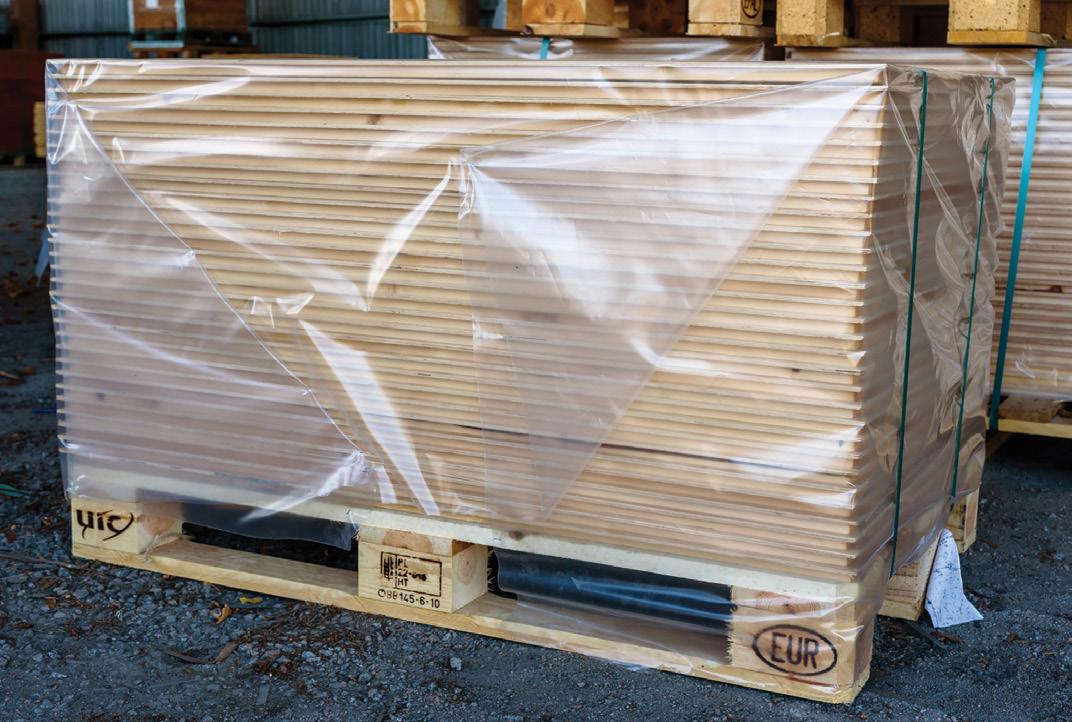
Plastic remains the most commonly used packaging for construction products and is being targeted by HMRC’s Plastic Packaging Tax, which came into force on the 1 April 2022. The tax applies a charge of £200 per tonne to all plastic without a minimum of 30% recycled content. DEFRA’s plans to bring in Extended Producer Responsibility legislation in 2024 will incentivise the industry’s supply chain to reduce its overall packaging output, especially plastic packaging, or to adopt recycled materials where a significant reduction in volume may not be possible.
Timber Development UK, to help members get to grips with these changes, commissioned Valpak to do a ‘deep dive’ into what this means for the timber supply chain. Some of the key insights included in the report are:
• Under the proposed Extended Producer Responsibility Regulations, more businesses will be captured and they will face greater cost, as compared with the current regime
• Businesses with a turnover equal to, or greater than, £1 million, and handling packaging of 25 tonnes or more, must complete bi-annual reporting
• The government predicts that under this new regime the overall financial costs for producers will rise from £230 million to £1.7 billion, as it seeks to recover 100% of recycling packaging costs (up from 7%)
• The new Plastic Packaging Tax, which came into force on 1 April 2022, means producers or importers of plastic packaging that contains less than 30% recycled plastic will be taxed an additional £200 per tonne.
• This tax applies to all business importing or manufacturing 10 tonnes or more of finished plastic packaging components within a 12-month period.
• Businesses that import or manufacture less than 10 of taxable packaging over a 12-month period must keep detailed records to prove to HMRC they do not qualify for the tax
• Businesses can mitigate costs from these changes by making use of easily recycled packaging, recovering packaging waste themselves, of through reusable packaging.
Readers of the report will gain insight on how they may be able to mitigate the impact of the change in regulations on their businesses, as well as the timeline for change. The report aims to first summarise the current packaging waste regulations and how they affect the members of Timber Development UK regarding specific products we know are handled, before turning to the prospective changes to the packaging waste regulations. These upcoming changes, which are still prospective at the moment, otherwise known as ‘Extended Producer Responsibility’, encompass a marked change in the regulations.
In summary, the report states: “The current packaging waste regulations, under the principle of shared producer responsibility, is a complex system with which members of Timber Development UK interact at multiple junctures. These regulations will see significant change in the coming years, with dates for reform set in 2024. Some of the exact details of the reform are not yet certain, but the nature of that reform is.
“This change comes in three main forms: changes to financial burdens for packaging producers, changes to the compliance system Timber Development UK members interface with, and changes to the kind of data Timber Development UK members will be required to collect. With these provisional changes explained, this document has also attempted to explain the ways in which Timber Development UK members can mitigate the impact of changes to their business operations and the earliest possible dates by which they will see these changes come into force. Following on from this discussion, this document has also given a brief overview of the Plastic Packaging Tax which came into force on the 1 April 2022, and some of the implications of this tax for Timber Development UK members.”
Independent merchants
The National Buying Group (NBG) is to accelerate its talks with packaging suppliers as it steps up efforts to reduce plastic packaging in the construction supply chain and the potential tax impact on independent merchants. A recent NBG Sustainability and Cost Reduction Forum meeting, attended by both Partners and Suppliers, was given the results of an in-depth audit of a builder’s merchant that is facing a potential tax bill in excess of £75,000.
With concerns surrounding plastic packaging in the construction supply chain, both TDUK and the National Buying Group have offered guidance and support.
Plastic packaging remains widely used across the building products sector so collaboration will be needed to mitigate the impact of a looming increase in plastic packaging tax
Timber Trader UK Magazine Autumn 2022 32 www.timbermedia.co.uk @Timber_Media FEATURE PACKAGING
The same audit calculated that suppliers of plastic packaging to Kellaway could be set for an even greater increase. With suppliers deemed to have the greatest influence on the packaging set for an increase of somewhere between a 10 and 30-fold increase on current prices, the audit calculated a potential jump from £3,000 in 2022 to a staggering £196,000 come 2024.
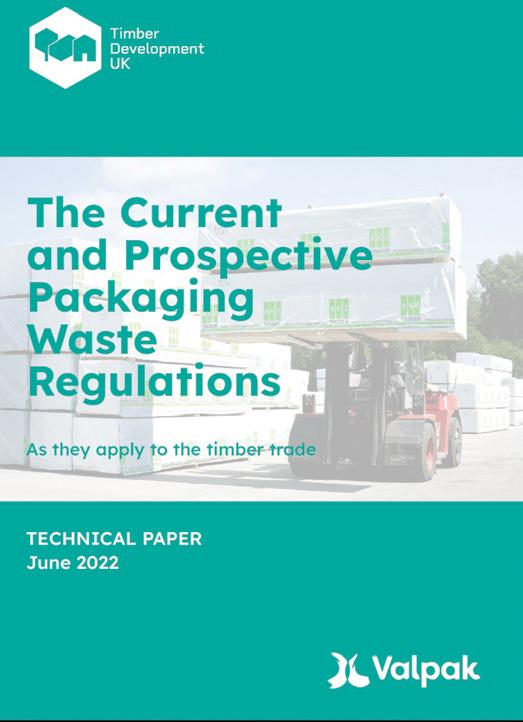





Bob Fleetwood of Kellaway Building Supplies, who is leading NBG’s plastics reduction team along with Jasmine King from NBG’s Central Team, says the audit looked at all areas of the merchant’s activity, both indoors and in the yard, to build up a picture of what merchants are facing in terms of their tax liability. The audit identified multiple areas that require further examination, including the use of plastic packaging for branding purposes, the potential over-use of stretch wrap to secure product to pallets and the use of dumpy bags for transporting aggregate.
“The audit looked at everything from hand tools to roofing felt, insulation and timber along with all packaging types from branded packaging to bubble wrap, stretch and shrink wrap,” Mr. Fleetwood explains. We now need to understand why manufacturers of building products use plastic packaging, what alternatives can be put in place, such as recycled plastic packaging and, perhaps
most importantly, where it can be eliminated altogether with no impact on product quality, transportation or merchant yard safety.


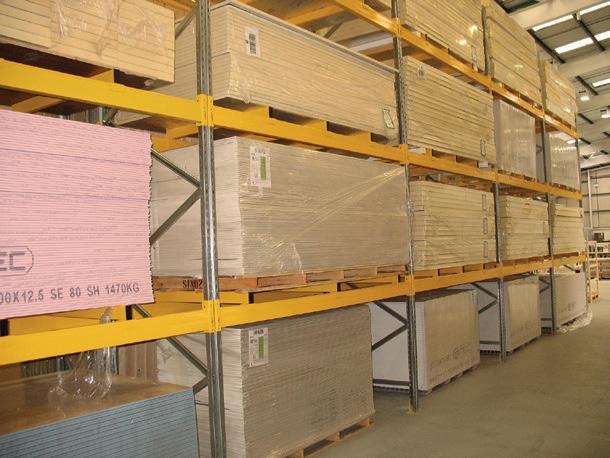











Fleetwood says the audit has given NBG a much better understanding of where the problem areas are. “We will never be able to eliminate plastic packaging entirely, but the audit did identify areas for reduction. There are clearly some products where it is entirely unnecessary to use plastic packaging, such as spades and other tools, or where it is for branding only, such as stone paving which is consolidated on wooden stillages.
Earlier in the year, Nick Oates, managing director at National Buying Group, said: “With merchant businesses carrying the cost burden, ideally redesigning packaging to eliminate or reducing plastic content is best, if they are to avoid a financial cliff-edge. If this is not possible the next best choice, will be switching to packaging containing 30% recycled content or more, all which must be supported by providing evidence based accurate product data. We’ve assessed one of our merchant partners, Kellaway Building Supplies, to try and understand the potential impact and the findings are very concerning. Our assessment is that a mixed merchant with 15 branches could be looking at an increase in the tax burden of circa 2,400%, from circa £5,000 to £105,000.”
 The full Valpak report, The current and prospective packaging waste regulations: As they apply to the timber trade, is free for download at
https://ttf.co.uk/download/the-current-and-prospectivepackaging- waste-regulations
can find out more about the NBG audit at
The full Valpak report, The current and prospective packaging waste regulations: As they apply to the timber trade, is free for download at
https://ttf.co.uk/download/the-current-and-prospectivepackaging- waste-regulations
can find out more about the NBG audit at
Timber Trader UK Magazine Autumn 2022 33 www.timbermedia.co.uk @Timber_Media FEATURE PACKAGING WE DESIGN, MANUFACTURE AND INSTALL C ANTILEVER RACKING, PALLET RACKING, VERTIC AL STORAGE AND PIGEON HOLE RACKING WE MAKE THE UK’S WIDEST RANGE OF STORAGE OPTIONS FOR TIMBER MERCHANTS www.stakapal.co.uk www.semcoltd.co.uk www redirack.co.uk BETTY’S LANE, NORTON C ANES, C ANNOCK, STAFFORDSHIRE, WS11 9NZ PROJEC T RACKS DESIGNED AND HIGH QUALIT Y RACKING HIGHLY COMPETITIVE BESPOKE C ALL US NOW FOR YOUR FREE SITE SURVEY ON 01543 278123 OR EMAIL sales@stakapal.co.uk
You
www.nationalbuyinggroup.com
New Timber Talent
NMITE has launched two short courses in Timber Technology Engineering Design to upskill and reskill UK built environment professionals.

Since opening in September 2021, the New Model Institute for Technology & Engineering (NMITE) now offers both a BEng and MEng in Integrated Engineering, and is launching two new short CPD courses. Delivered in partnership with Timber Development UK and Edinburgh Napier University, the first course started on 26 September 2022.
Timber Technology Engineering Design 1 (TED 1) is a 12-week blended course composed of online distance learning and three oncampus challenge sprints of one week each. The Timber Technology Engineering Design 2 (TED 2) 12-week course will begin in January 2023, for those who have completed TED 1.
Both courses aim to build a community of knowledge in timber as a building material, contribute to the UK’s understanding of sustainable building, and provide a generation of timber professionals with an understanding of the principles of timber design construction and engineering methods within the context of the built environment. NMITE says, as well as in the UK it expects the courses to attract attention internationally in regions where timber construction is prevalent.
Associate professor Aghlab Al-Attili, academic lead says “We have developed the courses to appeal to a wide range of Built Environment Professionals, working full or part-time in architecture firms and construction companies including designers, architectural assistants or those involved in technical sales. There is currently no CPD course that directly addresses timber in construction on this scale of detail with the same degree of academic rigour and associated learning techniques which address the market need.”
NMITE’s new Centre for Advanced Timber Technology (CATT) building is now in operation. Robert Hairstans who was appointed as CATT’s founding director in March 2021 to lead the development and delivery of the building and to help establish it as the leading national location in timber education said: “We are delighted to see how fast things have moved in the last year. These two new courses will reach new audiences, outside our Integrated Engineering BEng and MEng students, attracting attendees from the UK and internationally. It shows both the speed at which NMITE can move, the role it can play in delivering both degree programmes and short courses, and therefore the impact we will
have in timber education.”
NMITE’s vision is to deliver a different model of engineering higher education developing work-ready, talented engineers. It aims to recruit a diverse cohort, including learners who may not have considered engineering as a career. These learners won’t be studying engineering, instead they’ll be learning how to become engineers. NMITE’s curriculum brings the engineering disciplines together and integrates the liberal arts and the interpersonal skills needed by today’s employers to tackle the world’s problems.
“Right now, we have a really incredible opportunity for learners to get on the ground floor of this new course, and become part of a leading group within the future of timber construction in the UK,” says Professor Robert Hairstans. “As the first course of its kind, Timber TED offers the most well-rounded education on all elements of timber construction available in the UK, helping understand the journey of wood all the way from tree to high performing construction product. We are also close to securing funding to support the tuition fees of some pioneer learners. By registering early you increase your chance to get into the course, and to get some additional help towards your fee from our backers.”
Timber TED 2, the second of these courses, covers design, construction, technology, and manufacture. It’s set to become available in early 2023. Both Timber TED courses take a blended learning approach of online and in-person teaching at the new purpose built NMITE campus in Hereford formed itself for advanced timber technologies.
“We are delighted to have been able to work so closely with NMITE and Edinburgh Napier University in the development of such an important series of courses,” says Tabitha Binding, TDUK’s head of education and engagement. “There is a huge skills crisis in the construction sector, especially when you consider the volume of work needed for the industry to achieve net zero by 2050. This covers what was clearly a gap in the market around timber engineering and design education. These courses will not only provide fundamental skills for those looking to expand their knowledge, but also futureproof their skill set within a climate crisis calling out for more sustainable design.”
More at www.nmite.ac.uk

Timber Trader UK Magazine Autumn 2022 34 www.timbermedia.co.uk @Timber_Media FEATURE TRAINING
Handloaded timber solutions from Stakapal
Whatever your timber storage requirements are - Stakapal offer a complete range of racking solutions tailored to meet your individual picking requirements.

Most warehouse facilities will have dedicated pedestrian zones that are separate from busy areas that regularly utilise forklifts and other mechanical machinery.
Stakapal manufacture a choice of either horizontal or vertical storage systems that are specifically designed to meet your operational requirements. For hand-loaded storage and selection of a range of softwoods, hardwoods, timber profiles and decorative mouldings in relatively small quantities we offer the following options:

Pigeon Hole Racking
Pigeon Hole Racking is a horizontal storage system which gives you the capacity to store and select a variety of differing lengths of long products. Your range is stored in separate compartments that are divided by vertical beams that can either be fixed in place or adjustable dependent upon your individual requirements. The 50mm pitch of our post section ensures maximum adjustability making this an extremely versatile storage option.
We also offer customers the option of an additional raised storage area above the racks which is accessible by a side staircase with hand rails. Loading gates can also be manufactured where appropriate and the system can be supplied with a fully decked finish or left prepared ready to fit your own floor at a later date.
Vertical Storage/A Frame Racking
Opting for our Vertical Storage/A Frame Racking could ultimately save you valuable warehouse space. Available in either a single-sided configuration for storing against a wall or a double-sided configuration dependent upon your floor area.
This type of system as the name suggests enables you to store a selection of products vertically with the item’s length resting on a
sloped frame shaped like an ‘A’. With a range of differing frame heights, you can store any product length up to 6m. Standard bay widths are 2700mm or 1350mm which can be separated into infinitely adjustable compartments using either D dividers or divider arms.
With over 55 years’ experience of manufacturing storage solutions for the timber industry, Stakapal are full members of SEMA (Storage Equipment Manufacturers Association) which means our products have been designed, manufactured and installed to rigorously defined standards. We offer a range of Cantilever Racking and Pallet Racking solutions as well as a full range of Warehouse Racking Systems.
Call us for your free site survey on 01543 278123, email
sales@stakapal.co.uk or visit
www.stakapal.co.uk
Timber Trader UK Magazine Autumn 2022 35 www.timbermedia.co.uk @Timber_Media ADVERTORIAL STAKAPAL
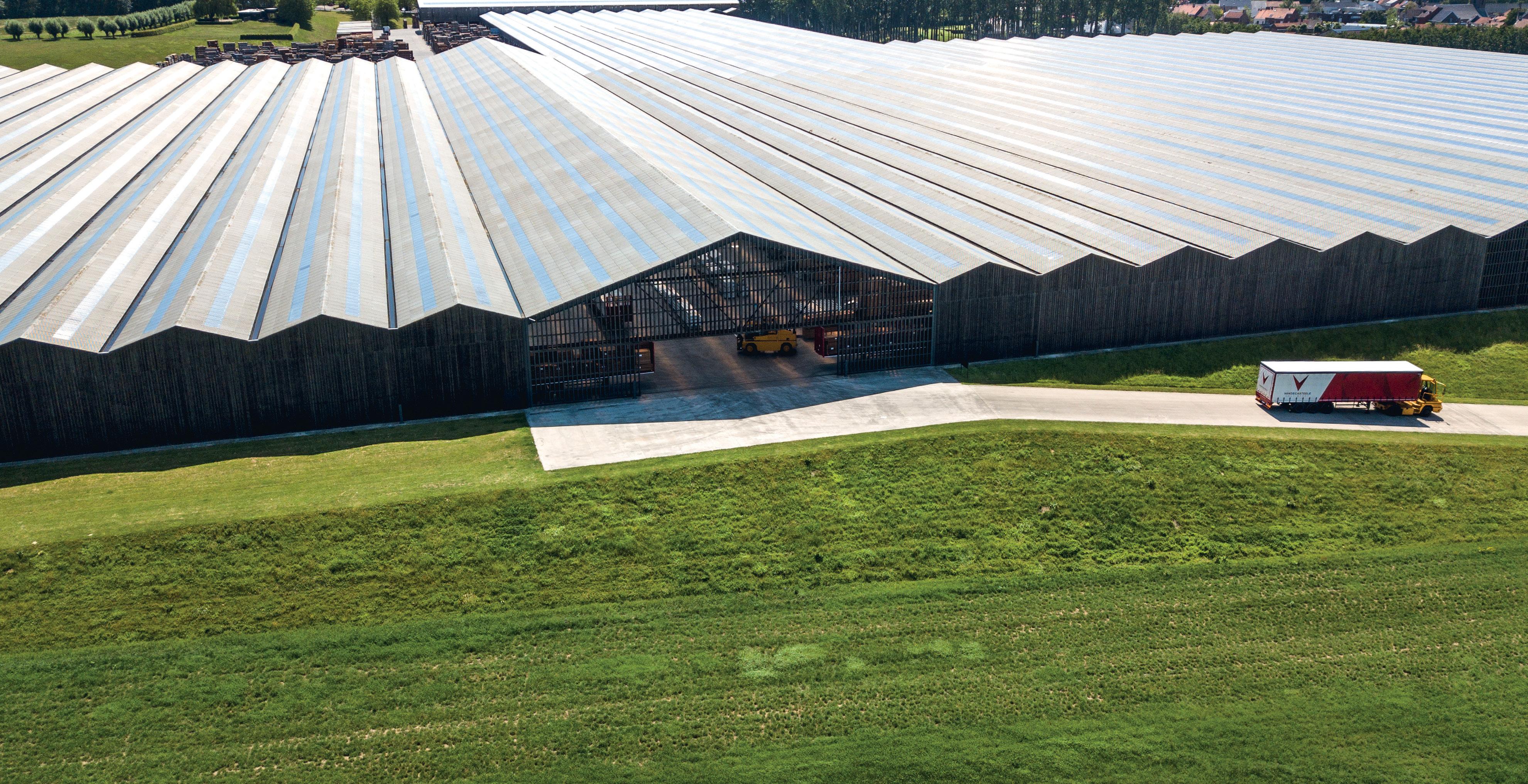


Timber Trader UK Magazine Autumn 2022 36 www.timbermedia.co.uk @Timber_Media Endless possibilities for decking and cladding Choose life, Choose wood


Contact Bergstraat 25 8511 Aalbeke Belgium vandecasteele.be genevieve@vandecasteele.be +32 56 43 33 00 dave@vandecasteele.be +44 15 94 83 43 32 Discover our world of timber Nature’s first choice Ask for your personal login to our online portal Prompt delivery More than 50 decking species
Better, connected.
Flexibility
Just like Kevin, Timber Connection know how important flexibility is in business today. In an ever-changing landscape we’re adapting to trading conditions before your very eyes, ensuring we’ll have what you want exactly when you want it.

From forward ordering to just in time deliveries, from consignment call off deals to ex quay and on water options, we have the solutions.
Timber Connection, we’re easy to do business with.
www.timberconnection.co.uk







